-
Better policy translation to achieve just net zero transitions locally
A just transition to net zero requires policymakers and practitioners at the local level to be able to draw on a wide range of national policy instruments. This brief makes recommendations on how the policy translation process from the national to the local level can be improved.
-
 Rethinking the governance of external consultancy in the public sector
Rethinking the governance of external consultancy in the public sector
Management consultancy use in the public sector has long provoked controversy, with questions over efficiency, effectiveness and ethics. These continue to be raised globally, with occasional scandals with firms such as McKinsey in the USA, PwC in Australia or Bain & Co. in the UK. This all suggests that approaches to managing the use of consultancy have not been effective. In fact, there are few checks and balances on consultancy which is surprising given how much is spent on it (over £3 billion in the UK public sector in 2023-4). One periodic policy response, currently planned by the UK government, is to cut the use of external consultants and do more work internally through an empowered and enlarged civil service. This ‘insourcing’ mostly makes sense, but there will always be some need for external expertise. So, what can be done by both clients and consultancies to help make it effective?
-
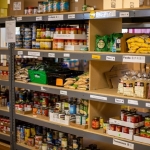 The rapid rise of food banks in schools: lessons for policy and practice
The rapid rise of food banks in schools: lessons for policy and practice
3.5 million school children in the UK live in food insecure households. Food insecurity is when people have ‘limited or uncertain availability of nutritionally adequate and safe food or having to acquire foods in socially unacceptable ways’ (Anderson 1990: 1560). Food insecurity negatively influences children’s educational and social outcomes.
-
Implementing the ‘Liberty Protection Safeguards’ is an urgent priority
In England and Wales, over 300,000 people are deprived of their liberty in connection with their care arrangements, yet their human rights are not well protected.
-
 Centre equity to create enduring UK-ASEAN Relations
Centre equity to create enduring UK-ASEAN Relations
The UK Government has set out suitable priorities and frameworks for engagement in Southeast Asia. It now needs to translate these into concrete programmes and develop relationships at different scales to produce sustainable and equitable partnerships.
-
 The use of sexual behaviour evidence in rape trials: challenging legal reasoning and decision-making
The use of sexual behaviour evidence in rape trials: challenging legal reasoning and decision-making
Public policy has been concerned with whether the current system is delivering justice for victims of sexual violence for some years. The government has commissioned numerous reviews including the End-to-End Rape Review in 2021. A key concern has been the way generalised, factually incorrect, and prejudicial beliefs about what constitutes rape and how rape victims (ought to) react influence legal proceedings.
-
‘Substituted parenting’ in the family courts: “too much” support for parents with learning disabilities considered harmful for children.
Parents with learning disabilities/difficulties (LD) are overrepresented in the family courts and are more than twice as likely to have their children removed, rather than supported to remain at home.
-
 What happens when migrant pupils turn 16?: A scoping study of 16+ provision for young migrants in the UK
What happens when migrant pupils turn 16?: A scoping study of 16+ provision for young migrants in the UK
We investigated what happens when young people reach the end of compulsory schooling at age 16 and don’t have the English proficiency skills to continue further study. Many go to college to continue their education but find themselves taking English classes as long as they have funding to do so (this typically runs out after three years).
-
 Generational attitudes to facial recognition: How retailers and policymakers should approach the use of developing facial recognition technology
Generational attitudes to facial recognition: How retailers and policymakers should approach the use of developing facial recognition technology
The use of facial recognition technology is becoming increasingly widespread. The technology, based on live or recorded CCTV footage, uses algorithms to recognise individuals’ gender, age, emotions and skin type. The use of facial recognition for national security is well known, but it is increasingly being used for commercial purposes, using data from public and private spaces (e.g shops) to track the behaviour of customers. So far, limited laws exist for this use of data. With the rapid technological development and usage, laws and rules are needed.
-
 Alternative Rites of Passage: What is their role in Female Genital Mutilation/Cutting abandonment?
Alternative Rites of Passage: What is their role in Female Genital Mutilation/Cutting abandonment?
Alternative Rites of Passage (ARP) are a popular strategy to encourage abandonment of FGM/C mainly in East Africa. Yet their effectiveness in eliminating or reducing FGM/C remains unclear. Two expert meetings have led to evidence-based recommendations for research, policy, and programmes on ARP.
-
 From mothers for mothers – supporting financial resilience through user-centered services
From mothers for mothers – supporting financial resilience through user-centered services
Mothers are often primarily responsible for managing the household budget on limited resources. The question of how to help low-income mothers build up financial resilience to better buffer and adapt to financial and economic shocks, has become even more urgent.
-
 Reform Development Finance Institutions’ (DFIs) grievance mechanisms to uphold human rights
Reform Development Finance Institutions’ (DFIs) grievance mechanisms to uphold human rights
In November 2018, leaders from nine communities from the Democratic Republic of Congo (DR Congo) whose land rights and livelihood were affected by the PHC-Feronia large-scale palm oil plantation took a historic step and filed a complaint with the Independent Complaints Mechanism (ICM), a so-called ‘alternative dispute mechanism’ aimed at finding a solution outside of courts. With the support of local and international civil society, they formulated clear requests concerning recognition of their land titles and remediation for the socio-environmental damages suffered since the DFIs decided to support the PHC-Feronia palm oil project.
-
 After a decade of austerity, urgent changes are needed to improve prison services
After a decade of austerity, urgent changes are needed to improve prison services
The UK government’s austerity measures, implemented in English prisons by the 2012 Benchmarking Programme, have led to a sharp reduction in the prison workforce and a cut in budgets. This has left English prisons unable to provide safe environments for rising prison populations.
-
Urgent reforms are needed for prison healthcare services after a decade of austerity
The UK government’s 2012 Benchmarking Programme, which implemented austerity measures on prison spending, has led to a reduction in the prison workforce without a corresponding reduction in the prison population. This policy has negatively affected healthcare in English prisons.
-
 Community-centred services support residents to build financial resilience
Community-centred services support residents to build financial resilience
From April to July 2022, community researchers from Lawrence Hill, Bristol, led in-depth interviews with residents, and held co-analysis and co-design workshops with stakeholders, to understand the financial lives of low-income households in their community, explore barriers and enablers to financial resilience and develop solutions.
-
 ‘We shouldn’t have to shout to be heard’: Valuing Parents as Experts
‘We shouldn’t have to shout to be heard’: Valuing Parents as Experts
Image credit: Becky Whitmore
-
Implementing the UK’s Indo-Pacific Tilt in Southeast Asia through equitable and sustainable partnerships
In June 2022, the University of Bristol hosted a workshop bringing together academics working on Southeast Asia. From a variety of disciplines, participants explored what an integrated presence could look like, and the different dynamics the UK needs to consider. This policy report summarises the findings of the workshop and offers policy recommendations for more effective engagement with Southeast Asia.
-
 Time to make it count: Implementing the UK’s new maritime security strategy
Time to make it count: Implementing the UK’s new maritime security strategy
In 2022, the UK government will launch a new National Strategy for Maritime Security (NSMS). The publication of the NSMS comes at a critical time. Maritime threats and risks to the UK continue to evolve and multiply, in home waters and beyond.
-
 Air navigation services should be funded as a public good
Air navigation services should be funded as a public good
COVID-19 is unlike any previous global crisis to befall the civil aviation industry. While airlines parked aircraft and laid off staff, Air Navigation Service Providers (ANSPs), the organisations who provide air traffic control, kept the skies open for all aircraft permitted to fly, including military, emergency and repatriation flights, domestic travel, general cargo, and medical supplies. As most ANSPs around the world are now funded from ‘user charges’ levied on airlines, revenues dried up while costs accumulated and key investments in new technology were put on hold.
-
 Do not renegotiate India and Pakistan’s Indus Waters Treaty
Do not renegotiate India and Pakistan’s Indus Waters Treaty
The Indus river system flows across the highly militarised border between India and Pakistan, including the contested territory of Kashmir. Sharing river waters in the basin has caused recurring tensions in bilateral relations between the two countries since 1948. The matter was ostensibly settled by the Indus Waters Treaty (IWT) of 1960, but Indian upstream hydropower development in the twenty-first century has caused renewed contention. Some commentators have called for the treaty to be amended or scrapped.
-
 Global pandemics require a community response
Global pandemics require a community response
People in minoritized ethnic groups were hit much harder by the coronavirus pandemic than others, with higher numbers of infections and deaths from the virus and also more exposure to the negative economic consequences of the pandemic and the associated lockdown.
-
 Securing a just transition to a climate resilient Bristol: obstacles and opportunities
Securing a just transition to a climate resilient Bristol: obstacles and opportunities
In February 2020, Bristol launched its ambitious One City Climate Strategy, committing to becoming carbon neutral and climate resilient by 2030. The Strategy, which sets out how Bristol will respond to climate change, calls for a fair and collaborative approach based upon a just transition. A just transition, loosely defined, is a transition to a post-carbon economy that is green, sustainable, and socially inclusive, leaving no one behind in the response to climate change. Bristol is one of the first cities in the world to make an explicit promise to pursue a just transition to combat climate change.
-
 Evaluating risk level in cities to support tourists and inhabitants during COVID
Evaluating risk level in cities to support tourists and inhabitants during COVID
Emergencies have a huge impact on the choice of tourism destination and the life of inhabitants in these areas. People are afraid to travel to those areas and either defer travel or change their destination. The World Tourism Organization estimated the economic loss for tourism due to COVID-19 is more than 2 trillion US dollars in global GDP (UNWTO, 2021).
-
 The Istanbul Convention and Queer Women Seeking Asylum
The Istanbul Convention and Queer Women Seeking Asylum
Lesbian, bisexual, queer, trans and intersex (LBTQI) women who are migrants, asylum claimants and refugees are particularly vulnerable to sexual and physical violence in their country of origin, during their journey to the reception country, during the asylum decision-making process and after having obtained refugee or humanitarian status within the European Union. This includes rape and sexual violence in refugee camps, reception centres and whilst in transit, so-called “honor” crimes, exploitation in sex work by traffickers and harassment by immigration officials and society at large.
-
 The UK Investor Visa: History, Aims and Controversies
The UK Investor Visa: History, Aims and Controversies
The report is aimed at the interested public, practitioners, policymakers, and other stakeholders. It is based on desk research, a review of historical immigration regulation, and expert consultation with over forty key stakeholders, including policymakers, immigration law practitioners, and investment professionals.
-
 Tackling teenage sexual violence: history shows culture, not just technology, should be addressed
Tackling teenage sexual violence: history shows culture, not just technology, should be addressed
Debates over the prevalence of peer-based sexual violence among teenagers and young people were reignited by Soma Sara’s Everyone’s Invited movement in 2021. In the space of several months almost 15,000 Everyone’s Invited users shared experiences of sexual harassment and abuse. These revelations have called into question how well government guidance on how to handle sexual violence between young people in education settings is being implemented. They also highlight areas for development within the delivery of Relationship and Sex Education (RSE) both within and beyond schools.
-
 Online information and advice to carers during the Covid-19 pandemic
Online information and advice to carers during the Covid-19 pandemic
During the Covid-19 pandemic demands on unpaid (family) carers have increased dramatically and more people have begun to care for older and disabled family members. Services for unpaid carers from local authority social services departments (LAs) and third sector organisations (TSOs) have changed in many ways, with the closure of carers centres, day centres and council offices. Websites have become an increasingly important source of information and advice. As the importance of websites has increased so has the need to ensure that people using them are able to find what they need. This research identifies how they are being used, what information and advice is made available and how user-friendly they are.
-
 COVID-19: Local coordination delivered emergency food, but food plans must address food insecurity
COVID-19: Local coordination delivered emergency food, but food plans must address food insecurity
The use of emergency food has increased hugely in the UK in the last 5 years, with the Trussell Trust reporting a 74% increase in food parcels provided between 2015 and early 2020.
-
Nutrition labelling helps individuals choose healthier foods
Front-Of-Pack (FOP) nutrition labels provide information on the energy, saturated fats, sugar and salt content of individual food products. In 2006, the UK Food Standards Agency (FSA) recommended retailers to introduce FOP nutrition labels on their products, focusing specifically on seven types of foods: ready meals, burgers / sausages, pies, breaded / coated meats, pizzas, sandwiches and cereal. This recommendation was taken up by several UK retailers.
-
We need better data to address regional race disparity
The Black Lives Matter movement and the global coronavirus pandemic has put ethnic inequalities in health, socioeconomic position and experiences with policing and other state institutions at the top of the political agenda. Understanding what these differences are and how to develop policies to effectively address them require evidence at both a national and regional level.
-
Not on the Buses: reduce inequality by subsidising bus travel for Bristolian children
In October 2017, Mia, then aged 11, told the audience at Bristol’s Festival of the Future City:
“My family don’t own a car and the bus fares are so expensive. Lots of people can’t get into Bristol to experience the city centre. Some children have never been into Bristol yet they only live a few miles away. So I want to ask you: how can children grow up and enjoy their cities if they can’t get around them? Is it fair that some children can’t do this at all?”
-
Can management consultancy be regulated?
In one of the first systematic attempts to identify an agenda for debating the governance of management consulting, three new policy areas are identified for consideration by consulting firms, clients and policy makers in government.
-
 Menopause in the Workplace: Employers’ Role is Critical
Menopause in the Workplace: Employers’ Role is Critical
Menopause can be a significant event in a person’s life, with a range of possible associated symptoms including night sweats, hot flushes, low mood, and increased anxiety. A 2017 government report highlighted the effect that a menopause transition can have on women’s participation in economic life and the workplace across the UK. Since the publication of this report, there has been an increase in public attention to workplace experiences of menopause transition.
-
 Professional understandings of child neglect in Namibia
Professional understandings of child neglect in Namibia
The Child Care and Protection Act (2015, p. 15) of Namibia defines child neglect as ‘a failure in the exercise of parental responsibilities to provide for the child’s basic physical, intellectual, emotional or social needs’. The Act also specifies that caregivers are responsible for providing for the child according to their abilities and capabilities. The harsh realities of extreme poverty and economic inequalities that many Namibian families face, raise many challenges within local communities, and result in the inability of many to adequately provide for their children’s basic needs.
-
 Children in informal care arrangements with extended family: messages for best practice in Namibia
Children in informal care arrangements with extended family: messages for best practice in Namibia
This Child Fosterage project provides personal and professional insights into the ways in which informal care arrangements impact upon children’s health and welfare. Five stakeholder workshops took place in the capital city of Windhoek in the Khomas region of Namibia in June 2019. Khomas is a region in central Namibia characterised by diverse racial and ethnic representations. Participants included: children’s practitioners, children’s rights’ network members, social workers, parents and carers, and children.
-
 Kept Apart: Immigration system needs reform to stop traumatic separation of families and couples
Kept Apart: Immigration system needs reform to stop traumatic separation of families and couples
Covid-19 gave many people in the UK an insight into the hardships of separation from family members. For those thousands of couples and families with non-British family members, however, separation is often not a new experience.
-
Bristol in Brief: Drugs in the South West
The illegal drugs market in the UK is estimated to be worth £9.4bn and results in a £20bn cost to society [1]. Drug use in the South West is common among both adults [2] and young people [3] and the region has some of the highest rates of all drug use in England and Wales. In line with the rest of the country, cannabis is the most used illicit substance. There are also a substantial number of people who inject drugs (PWID), with related harms to both the individuals and the wider community.
-
 The memories of marginalised communities need to be part of peacebuilding and transitional justice in Colombia
The memories of marginalised communities need to be part of peacebuilding and transitional justice in Colombia
MEMPAZ, a partnership between the University of Bristol, the National University of Colombia, and grassroots organisations helps victims of conflict creatively process their experiences and therefore enables them to shape transitional justice on their own terms. This promotes plural memories of the past and challenges top down narratives of conflict.
-
 The Recognition of Black Lesbian Asylum Claims in Germany
The Recognition of Black Lesbian Asylum Claims in Germany
In Southern Germany, evidence shows that about 95% of asylum cases lodged by lesbian-identifying women – mostly from Sub-Saharan African countries – get rejected after the first interview. This is in contrast to a 50% rejection rate of all LGBTQI+ individuals seeking asylum and a 30% rejection rate for heterosexual women. The Federal Office for Migration and Refugees (BAMF) does not collect data specifically on LGBTQI+ asylum claims. However, estimates gathered by the lesbian organization LeTRa in Munich, suggest that lesbian asylum seekers face specific challenges when seeking refugee protection in Germany. This particularly applies to the most vulnerable cohort within Germany’s asylum system – lesbian women racialized as Black. Besides legal challenges, Black lesbian women are more likely to experience sexual violence in reception and refugee camps and suffer forms extreme social isolation due to homophobia, misogyny, and racism.
-
 The Effects of COVID-19 on Queer Asylum Claimants in Germany
The Effects of COVID-19 on Queer Asylum Claimants in Germany
The Covid-19 pandemic clearly reveals the vulnerability of LGBTQI+ persons seeking asylum and refuge within the Common European Asylum System and as applied in Germany. The German government recognizes that the call to “stay home and save lives” potentially puts at risk vulnerable groups (i.e. women, children, elderly etc.) and increases isolation. However, people seeking asylum find themselves in cramped accommodation with less access to community and with increased instances of violence and trauma.
-
 Exploring hidden narratives in the West African Tramadol trade and transport of migrants
Exploring hidden narratives in the West African Tramadol trade and transport of migrants
West Africa’s role in illicit flows and their control has become a central concern for international and domestic policy makers of late, with attention coalescing around threats such as drug trafficking and irregular migration. Our current understanding of these activities and their alleged links to crime relies mostly on depictions from the outside, as West African data and narratives have been largely ignored. These narratives, however, can help to better understand what these activities mean locally, what has caused their emergence and what can address them as a policy issue
-
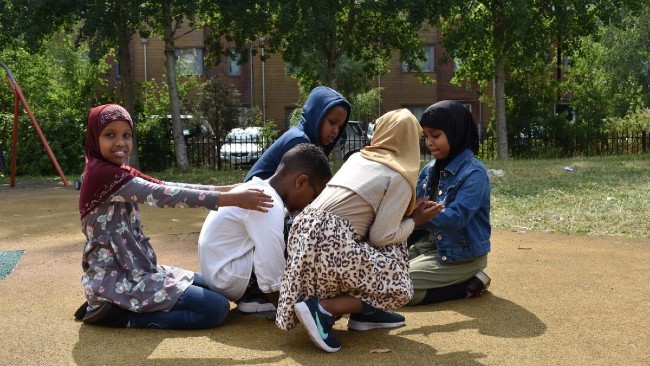 Improving outcomes for young children in refugee families: lessons from Somali parents’ experience of play and social interaction opportunities in the UK
Improving outcomes for young children in refugee families: lessons from Somali parents’ experience of play and social interaction opportunities in the UK
Our findings show how disadvantage can impair early child development in migrant families. Social isolation and lack of safe places to play are key points to address.
-
 Children in Need and Children in Care: Educational Attainment and Progress
Children in Need and Children in Care: Educational Attainment and Progress
Research shows that the educational attainments of Children in Need (CIN) and Children in Care (CIC) in England are significantly lower than for other pupils. This represents sizeable numbers of children: the latest figures (March 2019) showed that there were 399,500 Children in Need in England and 78,150 Children in Care. The ‘attainment gap’ between these groups and other children (without special educational needs) in reaching expected standards is approximately 25-30% at Key Stage 1 (aged 7) and KS2 (aged 11), and 25% at KS4 (aged 16).
Researchers have often investigated the education of Children in Care; however, Children in Need have received very little attention. This project aimed to identify factors that help explain this ‘attainment gap’ for Children in Need and Children in Care.
-
 Mapping science and policy priorities in a Changing Central Arctic Ocean
Mapping science and policy priorities in a Changing Central Arctic Ocean
The Central Arctic Ocean plays a pivotal role in regional and global climate and ocean circulation, and influences UK weather patterns.
-
 Delivering Maritime Security after Brexit: time for a joined-up approach
Delivering Maritime Security after Brexit: time for a joined-up approach
When the UK leaves the European Union the complex intergovernmental arrangements that for forty years regulated the usage of, and traffic through, its waters will revert to a national responsibility. Britain’s maritime sector will confront novel regulatory and enforcement challenges against a spectrum of rapidly evolving risks to its sea-lanes, fishing grounds and marine infrastructures, such as illegal fishing, human trafficking, terrorism and organised crime.
-
 Mayoral governance in Bristol: Has it made a difference?
Mayoral governance in Bristol: Has it made a difference?
The directly elected mayor model of place-based leadership was introduced into Bristol following a citizen referendum in 2012. The Bristol Civic Leadership Project is examining the impact of this new model on the governance of the city. This report assesses the performance of mayoral governance from 2012-20.
-
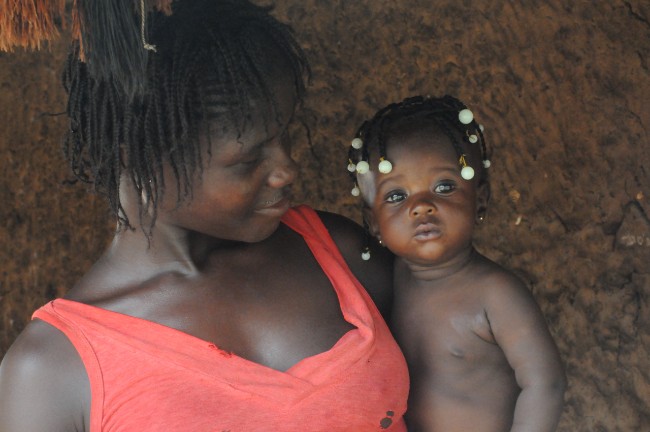 Provide women with information about the risk of pregnancy to increase contraceptive demand
Provide women with information about the risk of pregnancy to increase contraceptive demand
Total fertility rates in low-income countries remain high, averaging 4.6 children per woman. Importantly, these appear markedly higher than desired by women, resulting in over 52 million unwanted pregnancies and about 70,000 excess maternal deaths each year.1
-
 Lessons from political opinion polls: using surveys to value non-market goods such as human life
Lessons from political opinion polls: using surveys to value non-market goods such as human life
Putting a monetary value on human life supports decision makers in seeking a balance between the cost of a safety measure and the reduction in harm it delivers, but new research suggests that the value given to a human life – the Value of a Prevented Fatality (VPF) – by the UK Government is too low.
-
 Queer Asylum in Germany: Better visibility and access to legal and social support needed for LGBTQI+ people seeking asylum in Germany
Queer Asylum in Germany: Better visibility and access to legal and social support needed for LGBTQI+ people seeking asylum in Germany
Human rights violations based on sexual orientation and gender identity are grounds for seeking asylum in Europe. However, lesbian, gay, bisexual, trans, queer and intersex (LGBTQI+) people claiming asylum face particular legal and social challenges when they go through the asylum process. Within Germany’s asylum system, LGBTQI+ people seeking asylum belong to the least visible and most vulnerable group.
-
 'Biddable Youth': Twitter sports and esports gambling adverts: action required to protect children
'Biddable Youth': Twitter sports and esports gambling adverts: action required to protect children
The complexity of social media data has made it difficult to regulate online gambling advertising at scale. This is acute when it comes to children and those vulnerable to problem gambling. A particular issue is betting on esports (video games played competitively by professional gamers for spectators) often using cryptocurrencies like bitcoin.
-
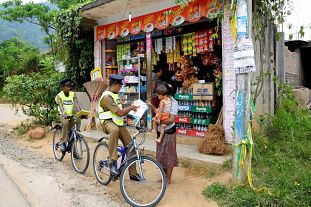 Sri Lanka: Responding to new challenges for peace in the shadow of the Easter Sunday attacks
Sri Lanka: Responding to new challenges for peace in the shadow of the Easter Sunday attacks
The 'Peace and Reconciliation in Sri Lanka' policy engagement was created as part of the Local International research project. The project investigates what peacebuilders care about and why they collaborate with certain individuals.
-
 The importance of being Dad: services working with families should recognise and support all fathers, including those with learning difficulties
The importance of being Dad: services working with families should recognise and support all fathers, including those with learning difficulties
Fathers are important. They can play a crucial role in a child’s life. But fathers are often overlooked, especially when they have learning difficulties.
-
 The fight for financial inclusion: free access to cash must be guaranteed across the UK
The fight for financial inclusion: free access to cash must be guaranteed across the UK
The rise of digital payments has put cash and its infrastructure under pressure: first bank branches closed as online banking increased, and now ATMs are shutting down at record pace.
-
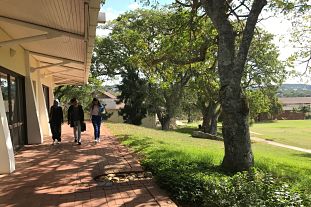 Higher Education in South Africa: addressing inequalities experienced by students from rural contexts
Higher Education in South Africa: addressing inequalities experienced by students from rural contexts
Significant inequalities in access and participation continue to be major challenges for higher education in South Africa, including representation, academic achievement and completion rates.
-
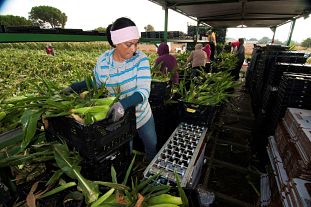 Work and workers should be central in the UK national food strategy
Work and workers should be central in the UK national food strategy
The conversations around the future of food, the Agricultural Bill and the UK national food strategy tend to focus exclusively on people as eaters, forgetting the role that women and men have in farming, harvesting, processing, selling, distributing and disposing of food.
-
 Privacy implications of pet wearables
Privacy implications of pet wearables
Pet wearables have significant privacy implications for consumers. This research into the extent of data collected by pet wearables has led to a clear understanding that consumer pet wearables available on the market capture far more data of owners than actual pets, and potentially mislead consumers into underestimating this extent of data capture. Moreover, pet data descriptions are often vague and may understate their potential to indirectly identify their owners or third parties.
-
 Rewarding food businesses that promote healthier and sustainable eating: Lessons learned from the Bristol Eating Better Award evaluation
Rewarding food businesses that promote healthier and sustainable eating: Lessons learned from the Bristol Eating Better Award evaluation
-
 Economic and social well-being in the UK: how living standards should be measured
Economic and social well-being in the UK: how living standards should be measured
This briefing calls for changes to the type of data collected and the approach to analysing the data, with a view to providing a more accurate indicator of living standards. This, in turn, will provide a clearer picture of economic and social well-being in the UK.
-
 National and local policies still need strengthening: findings from the Learning Disabilities Mortality Review
National and local policies still need strengthening: findings from the Learning Disabilities Mortality Review
The Learning Disabilities Mortality Review (LeDeR) programme in England is the first national programme of its kind in the world. It was established in response to concerns about premature deaths of people with learning disabilities that were related to a poor quality of health and social care provision.
-
 Addressing older men’s experiences of loneliness and social isolation in later life
Addressing older men’s experiences of loneliness and social isolation in later life
Loneliness can impact on people’s lives at any time, however, later life is consistently associated with loneliness (
Age UK, 2018). While higher percentages of older women report loneliness as a problem compared to men, a greater number of older men (50+) report moderate to high levels of social isolation (
Beach & Bamford, 2013).
-
 Common Cause: action needed to create fair and mutual research partnerships between universities and Black and Minority Ethnic Communities
Common Cause: action needed to create fair and mutual research partnerships between universities and Black and Minority Ethnic Communities
In the UK, Black and Minority Ethnic (BAME) groups are under-represented in all areas of research-intensive universities and in research leadership roles in higher education. Action needs to be taken to address this, and such action necessarily includes widening participation, action on the curriculum, and attention to structural inequalities within the university. The Common Cause project focused on addressing this inequality in research.
-
 Ensuring trans people in Wales receive dignified and inclusive health and social care in later life: The Trans Ageing and Care (TrAC) project, 2016-18
Ensuring trans people in Wales receive dignified and inclusive health and social care in later life: The Trans Ageing and Care (TrAC) project, 2016-18
Stonewall estimates that around 1% of the population identify as trans, including people identifying as nonbinary, though there are no accurate estimates of the number of trans people in the UK. The recent UK survey of over 108,000 LGB&T respondents commissioned by the UK Government (2018) indicates that trans respondents (13% of the sample) report lower life satisfaction scores than the general population.
-
 Reimagining refugee rights: addressing asylum harms in Britain, Denmark and Sweden
Reimagining refugee rights: addressing asylum harms in Britain, Denmark and Sweden
For people seeking asylum in Northern Europe, reaching a safe country is a key goal. However, many face unexpected and unduly harsh realities: poverty, poor healthcare, racism and Islamophobia can make life incredibly difficult. This raises serious ethical concerns. Rather than accessing rights, many people experience the degeneration of their mental health, loss of job-related skills as time goes on, and social isolation.
-
 Universities should review support, assessment and contextual offers for widening participation students
Universities should review support, assessment and contextual offers for widening participation students
Value-added measures of educational effectiveness provide indicators of the extra value that is added by schools to student attainment over and above the progress or improvement that might normally be expected.
-
“Stigmatising” and “traumatising” approaches to FGM-safeguarding need urgent review
Female Genital Mutilation (FGM) is considered by the UN to be a ‘global concern’. International organisations routinely claim a 98% prevalence rate among the Somali population (UNICEF 2013). As a consequence, Somalis living in the UK have attracted particular attention from FGM-safeguarding policy. This research presents the perspectives of Somali families living in Bristol with experience of FGM-safeguarding services.
-
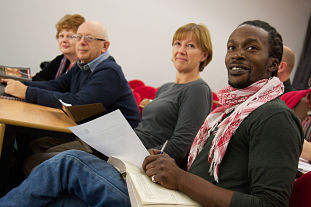 Universities should be accessible to everyone, with lifelong learning at the heart of their work
Universities should be accessible to everyone, with lifelong learning at the heart of their work
This research, which draws on the authors’ experience of creating courses that recruit students without qualifications, offers practical policy solutions that would make universities more accessible and more responsive to a changing economy.
-
 NHS managers: part of the solution, not the problem
NHS managers: part of the solution, not the problem
Policymakers and sceptical public opinion have frequently cast doubt on the contribution of public sector managers. This is especially true in the NHS, where it is claimed that managers soak up resources that might otherwise be used to improve front line services.
-
 The Government’s Progress 8 school performance measure needs to account for pupil background
The Government’s Progress 8 school performance measure needs to account for pupil background
Progress 8 is the Department for Education’s (DfE) headline measure of the average academic progress pupils make in each school over secondary schooling.
The measure adjusts pupils’ GCSE results for their end of primary schooling Key Stage 2 test results.
The DfE and Ofsted both rely heavily on Progress 8 to hold schools to account.
-
 Understanding integration processes: informing policy and practice
Understanding integration processes: informing policy and practice
Governments and cities across Europe are developing strategies to enhance integration. In England, the publication of the government’s Integrated Communities Strategy Green Paper has highlighted integration as a policy challenge at national and local levels. This briefing paper sets out a model of integration to provide a systematic basis for the design and evaluation of integration policies and initiatives.
-
 Minimising the Risks of Major Industrial Accidents
Minimising the Risks of Major Industrial Accidents
The UK Government has recognised large industrial accidents as major risks to infrastructure in the UK. Serious accidents (and near misses) still regularly occur worldwide in all ‘high-hazard’ industries. They have the potential for major loss of life, environmental damage, and a massive impact in terms of lost production, company value, and reputation.
-
 Fetal alcohol spectrum disorder: prevention, identification and support need more resources
Fetal alcohol spectrum disorder: prevention, identification and support need more resources
Up to 17 per cent of UK children could have symptoms consistent with fetal alcohol spectrum disorder (FASD). Before this study no UK estimates existed.
-
 A UK right to food law could tackle food poverty and environmental degradation
A UK right to food law could tackle food poverty and environmental degradation
Around 8.4 million people in the UK struggle to get enough to eat. At the same time, small-scale farmers and local grocery shops are disappearing, the country is increasingly dependent on food imports and healthy food is too often unavailable or unaffordable. Enshrining a right to food in law can end this situation.
-
 Delivering public health outcomes: vending machines should stock healthier food and drinks
Delivering public health outcomes: vending machines should stock healthier food and drinks
Our environment influences what we eat. The Government’s
National Planning Practice Guidance outlines the importance of ‘planning for an environment that promotes access to healthier food’. Foods sold in vending machines in
hospitals, workplaces and
recreation facilities are obesogenic (likely to contribute to obesity), as they are energy dense (more calories per bite), high in fat and sugar and low in fibre.
-
 All parents should be offered the opportunity to engage with the review of their baby’s death
All parents should be offered the opportunity to engage with the review of their baby’s death
When their baby dies shortly before or after birth, parents often want and need to understand why. Yet there is no standard process currently for engaging parents in the hospital review
which follows the death of their baby. This process is vital to prevent future deaths. Parental engagement is now mandatory in the
PMRT programme.
-
 Industrial Sustainability and the Role of Research in Addressing the UK Industrial Strategy’s Grand Challenges
Industrial Sustainability and the Role of Research in Addressing the UK Industrial Strategy’s Grand Challenges
Industrial sustainability has been established as a core tenet of the UK’s Industrial Strategy. The Government’s Clean Growth agenda sets out a new narrative that embraces research and innovation to support the development of a regenerative, restorative and net positive economy.
-
 Enhancing the integration of Pakistani migrant husbands
Enhancing the integration of Pakistani migrant husbands
The integration of Pakistani spousal migrants is a key concern in two recent policy documents: the 2016 Casey Review, and the 2018 Integrated Communities Strategy White Paper.
-
 Sustainable fisheries, food security: lessons from tilapia fish in Tanzania
Sustainable fisheries, food security: lessons from tilapia fish in Tanzania
Fish production is increasing to meet the protein demands of a growing human population. However, cross-breeding large-bodied native species with small-bodied non-native species can reduce yields and lead to loss of unique biodiversity, with negative consequences for food security.
-
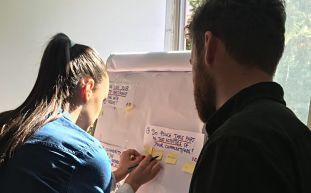 Enhancing the capacity of marginalised groups to make peace processes more successful
Enhancing the capacity of marginalised groups to make peace processes more successful
PeaceCapacity resulted from the findings of the EU-CIVCAP project, which assessed EU capabilities for conflict prevention and peacebuilding, and within this, capacity building.
-
 ‘Refugee and Asylum-Seeking Women’s Advocate’ - a new professional role to combat sexual violence?
‘Refugee and Asylum-Seeking Women’s Advocate’ - a new professional role to combat sexual violence?
Sexual gender-based violence is a global phenomenon that takes different forms in different contexts, but always reflects the unequal power and different roles that states, societies and cultures entrust to women and men due to their sex at birth.
-
 Transnationalizing Modern Languages: Reframing language education for a global future
Transnationalizing Modern Languages: Reframing language education for a global future
In a world that is changing with increasing rapidity, is our approach to the study of languages and cultures adequate to the challenges we face?
-
 Encounter, conversation and interaction: Improving community relations through religious education
Encounter, conversation and interaction: Improving community relations through religious education
Schools and teachers are in a unique position to improve community relations. This briefing calls for policy changes in order to harness these opportunities.
-
 Addressing challenges in acquiring British citizenship in times of Brexit
Addressing challenges in acquiring British citizenship in times of Brexit
Instead of tightening the process for longterm residence for EEA nationals, research suggests that the Home Office should use the Brexit period as an opportunity to overhaul the system and make the process simpler and more accessible for all long-term residents who satisfy legal requirements.
-
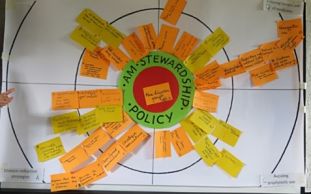 The future of farming policy in the UK: giving farmers a voice in development and delivery
The future of farming policy in the UK: giving farmers a voice in development and delivery
In a range of UK and international projects, the University of Bristol has been exploring how facilitated farmer-led approaches can tackle societal challenges, husbandry issues and market opportunities.
-
 Detention of fathers in the immigration system
Detention of fathers in the immigration system
Families routinely split by the immigration detention and enforced removal of foreign national fathers.
Detainees and their families find separation profoundly distressing. 85% of detainees are men and many have dependants in the UK.
-
 Reaping the rewards from UK leadership in farm animal welfare: time for a national strategy
Reaping the rewards from UK leadership in farm animal welfare: time for a national strategy
Research led by the University of Bristol and partners provides the evidence to show that current support for improved animal welfare policy is sustainable and achievable.
-
 Immigration enforcement and Article 8 rights: Mixed-immigration status families
Immigration enforcement and Article 8 rights: Mixed-immigration status families
Political pledges to reduce immigration are splitting up families. A series of recent changes to policy and legislation seek to reduce arrivals and increase removals and deportations, particularly of irregular (‘illegal’) migrants and foreign national offenders (FNOs). There are gendered dimensions to the effects, including men consistently making up over 85% of the foreign nationals detained and expelled from the UK.
-
 Deporting High Harm foreign criminals: Operation Nexus
Deporting High Harm foreign criminals: Operation Nexus
Operation Nexus is framed as targeting ‘High Harm’ foreign national offenders (FNOs), but also draws in low-level, petty and historical offenders, as well as those merely alleged to have ‘criminal character’ on the basis of ‘non-conviction’ evidence such as anonymous allegations and circumstantial evidence.
-
 Children growing up in the care of relatives in the UK
Children growing up in the care of relatives in the UK
The family environment that children grow up in can greatly influence their outcomes in terms of development and wellbeing. Although most children in the UK still live with at least one parent, some are unable to live with their parents due to reasons such as neglect or abuse by parents, parental sickness or death, parents being in prison, family circumstances such as poverty, parental drug and alcohol abuse or mental health issues. The majority of these children live with relatives or friends, otherwise known as kinship care.
-
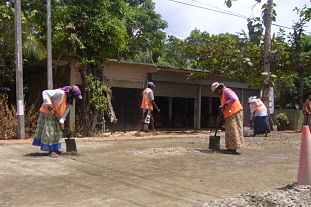 Preventing suicide in Sri Lanka: Supporting vulnerable populations
Preventing suicide in Sri Lanka: Supporting vulnerable populations
In the last two decades, Sri Lanka has made significant progress in reducing its suicide rate, but the suicide rate in young people is still twice that seen in high-income countries. There is an urgent need
for a cross-sectoral approach to reduce the suicide rate in Sri Lanka.
-
 Advising in Austerity: The value of good advice
Advising in Austerity: The value of good advice
In 2015/2016 The Citizens Advice Network delivered £361 million in savings to government and public services, and £2 billion in economic value to society. The majority of their work was
carried out by 23,000 volunteers who it would have cost £114 million to employ.
-
 Poo Patrol: Community-led science and action to reduce dog fouling and improve child health
Poo Patrol: Community-led science and action to reduce dog fouling and improve child health
Fouling of public areas by dog faeces has serious public health impacts, not least by discouraging healthy outdoor play.
This research engaged schools and communities to support and monitor their efforts to stimulate behaviour change among dog owners.
-
 Pregnancy loss: consistent bereavement care pathways needed
Pregnancy loss: consistent bereavement care pathways needed
This research looked at the extent to which the Human Tissue Authority (HTA) Guidance (2015) has been incorporated into hospital policies for the management and disposal of pregnancy remains within NHS England.
-
 Developing inclusive care homes for older people who identify as lesbian, gay, bisexual and trans (LGBT)
Developing inclusive care homes for older people who identify as lesbian, gay, bisexual and trans (LGBT)
Care home staff and managers often lack knowledge about the delivery of personalised care to older LGBT residents.
-
 Measures of school performance are biased by genetic differences between students
Measures of school performance are biased by genetic differences between students
Some value-added measures reflect genetic differences between students and may misattribute pre-existing differences in pupil ability to school and teacher performance, leading to biased school league tables.
-
 Comparing Chilean school performance: improving fairness in the classification of schools
Comparing Chilean school performance: improving fairness in the classification of schools
In recent years Chile has introduced new school accountability mechanisms. This research examines primary and secondary school performance in context using value-added approaches.
-
 EU maritime capacity-building in the Horn of Africa
EU maritime capacity-building in the Horn of Africa
Since 2015, the mission has adapted its mandate to better reflect local needs: it no longer treats piracy
as a crime in isolation, but supports the development of maritime civilian law enforcement authorities and
their operational capabilities.
-
 Strategic Defence and Security Review 2015: Defence Must Close the Civil-Military Gap
Strategic Defence and Security Review 2015: Defence Must Close the Civil-Military Gap
The armed forces are dependent on the societies of which they are a part. In democracies, the military derives its purpose from acting in Society’s name; whether to protect the nation from threat, or to advance its interests.
-
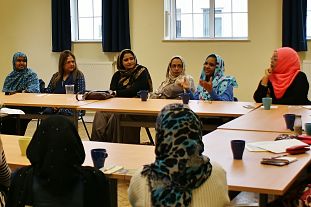 Enhancing spaces for Muslim women’s engagement
Enhancing spaces for Muslim women’s engagement
This Bristol-based research project explored how opportunities and spaces for Muslim women’s engagement can be enhanced.
-
 Afghanistan: no holds barred. If sustainable peace is to be achieved, negotiations must be open to all
Afghanistan: no holds barred. If sustainable peace is to be achieved, negotiations must be open to all
This research focuses on the nature of negotiations needed to bring about sustainable peace in Afghanistan.
-
 Trident Renewal: future vulnerabilities must be taken seriously
Trident Renewal: future vulnerabilities must be taken seriously
This briefing explores the challenges facing British defence in the aftermath of the 2015 Strategic Defence and Security Review.
-
 Extending initial teacher education to raise standards and improve teacher retention
Extending initial teacher education to raise standards and improve teacher retention
This research explores ways of improving initial teacher education to help solve the looming teacher supply “crisis”.
-
 Widening access to university: Step change needed to support talented learners from disadvantaged backgrounds
Widening access to university: Step change needed to support talented learners from disadvantaged backgrounds
The choice of facilitating* subjects at A-level plays a crucial role in students’ ability to access Russell Group universities.
-
 Marriage and Migration: facilitating the integration of migrant spouses
Marriage and Migration: facilitating the integration of migrant spouses
Integration interventions for migrant spouses should take account of gender, life stage, family and work commitments.
-
 Trident renewal: Strategic utility and trade-offs must be made explicit
Trident renewal: Strategic utility and trade-offs must be made explicit
This work explores the challenges facing UK defence in the run-up and aftermath of the 2015 Strategic Defence and Security Review.
-
 Improving urban neighbourhoods for all: Don’t rely on the middle classes
Improving urban neighbourhoods for all: Don’t rely on the middle classes
This research examines the extent to which the middle classes engage in social mix and whether doing so brings benefits to all urban residents.
-
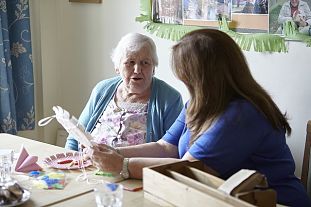 Care homes need urgent review
Care homes need urgent review
This research examines how we can improve the quality of life of older people in care homes.
-
 One size won’t fit all: Buildings have diverse effects on health and the environment across Europe and China
One size won’t fit all: Buildings have diverse effects on health and the environment across Europe and China
This particular sub-study of URGENCHE examines environment and health implications of the heat and electricity required by the buildings in: Kuopio, Finland; Basle, Switzerland; Stuttgart, Germany; Thessaloniki, Greece; and Suzhou and Xi’an in China.
-
 The success of ‘naming and shaming’: league tables have a positive impact on performance of schools and hospitals
The success of ‘naming and shaming’: league tables have a positive impact on performance of schools and hospitals
This research focuses on the impact of league tables on school and hospital performance.
-
 Teenage Kicks: Cultural policy and practice needs to reflect the views, lives and ideas of young people
Teenage Kicks: Cultural policy and practice needs to reflect the views, lives and ideas of young people
We must provide young people with an opportunity to voice their understanding of culture, who influences it and how and why they value it. This can help cultural policy makers to design a cultural offer that best meets young people’s needs.
-
 Recognising the complexity of urban governance and leadership is critical for sustainable future cities
Recognising the complexity of urban governance and leadership is critical for sustainable future cities
This research focuses on issues of city leadership and capacity in moving to a sustainable and resilient urban future.
-
 Widening participation in the digital age: can online networks and technologies support underrepresented students in succeeding at university?
Widening participation in the digital age: can online networks and technologies support underrepresented students in succeeding at university?
Online social networking practices can support the retention and success of more diverse students at university.
-
 Employment tribunal fees deny workers access to justice
Employment tribunal fees deny workers access to justice
This research examines the effects of employment tribunal fees on workers’ lives and livelihoods.
-
 Registering children as British citizens: current laws require overhaul
Registering children as British citizens: current laws require overhaul
This research explores how the law on registering children as British citizens operates in reality.
-
 Brexit: clarity is essential before the UK pulls the Article 50 trigger
Brexit: clarity is essential before the UK pulls the Article 50 trigger
The UK and the EU should agree on the withdrawal process in advance of the decision to pull the Article 50 trigger, in order to reduce the risk of litigation.
-
 Life chances: Re-imagining regulatory systems for low-income families in modern urban settings
Life chances: Re-imagining regulatory systems for low-income families in modern urban settings
Low-income families have skills and capabilities that are rarely recognised by Government and the regulatory services. Governments should work in partnership with communities so that policies and services work for all families, moving away from stereotypes.
-
 A directly elected mayor can enhance visible city leadership
A directly elected mayor can enhance visible city leadership
Based on Bristol’s experience with a directly elected mayor, this research evaluates the move to mayoral governance.
-
 What can we expect from a metro mayor?
What can we expect from a metro mayor?
Bristol City Council adopted a directly elected mayor in 2012.
-
 Researchers and mathematics teachers must collaborate to overcome barriers to student participation in Higher Education
Researchers and mathematics teachers must collaborate to overcome barriers to student participation in Higher Education
Collaboration between researchers and mathematics teachers is essential if solutions are to be found for increasing participation in HE.
-
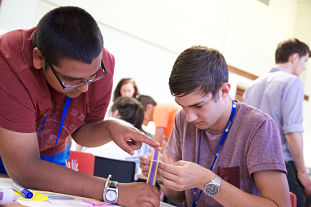 Bursaries are an important component of widening participation in Higher Education and their funding should be maintained
Bursaries are an important component of widening participation in Higher Education and their funding should be maintained
Bursaries bring far-reaching benefits for students from disadvantaged backgrounds and should be maintained alongside outreach programmes.
-
 Children’s British Citizenship: exposing the barriers to registration
Children’s British Citizenship: exposing the barriers to registration
Under current law, children may be recognized as British Citizens even where they fail to meet specific criteria, in recognition of the fundamental importance of children’s welfare. However, in practice, significant barriers to citizenship exist.
-
 Mayoral governance in Bristol: An initial assessment of impacts
Mayoral governance in Bristol: An initial assessment of impacts
The mayoral model of governance was introduced in Bristol in 2012. Significant changes have since resulted in the way the city is governed. Here we provide an initial assessment.
-
 Planning Ahead: EU crisis management interventions require local ownership at the earliest stage
Planning Ahead: EU crisis management interventions require local ownership at the earliest stage
The EU’s crisis management interventions would be more effective if national ownership was part of the entry strategy, rather than the exit strategy.
-
 Preventing and responding to conflict: Improving EU civilian capabilities must be prioritised
Preventing and responding to conflict: Improving EU civilian capabilities must be prioritised
This research explores ways in which civilian capabilities can enhance the EU’s efforts in conflict prevention and peacebuilding.
-
 Employment tribunal claims: debunking the myths
Employment tribunal claims: debunking the myths
Pursuing a tribunal claim was a struggle before fees and the weakening of employment rights came into play. Now the prospect is so off-putting that only a minority of those with valid claims will embark on this process.
-
 Another shake-up of school league tables: how should we measure and hold schools accountable for the progress of their pupils?
Another shake-up of school league tables: how should we measure and hold schools accountable for the progress of their pupils?
The new school progress measures continue to ignore the very large socioeconomic and demographic differences between schools which also drive results.
-
 Advising in Austerity: How Citizens Advice can adapt to uncertain times
Advising in Austerity: How Citizens Advice can adapt to uncertain times
The advice sector is key to supporting people to access their legal rights, but it is under threat from austerity. Innovative solutions are needed to ensure the sustainability of service provision.
-
 Appropriate Adults: Protecting the rights
and welfare of vulnerable adults in custody
Appropriate Adults: Protecting the rights
and welfare of vulnerable adults in custody
There is no standard model of funding for Appropriate Adult services for
vulnerable adults and provision is often inadequate. Local authorities can fund
provision as part of their wider safeguarding responsibilities.
-
 How do young refugees and their families encounter England’s education system?
How do young refugees and their families encounter England’s education system?
The fourth goal of the United Nations 2030 Agenda for Sustainable Development (SDG 4) aims to “ensure inclusive and equitable quality education” and opportunities for all (UN, 2016). Accordingly, young refugees in England are entitled to education and required to attend school in England.
However, there is limited information about the young refugees in England’s schools. Responsibility for refugees’ education sits with local authorities meaning there is limited information about the young refugees in England’s schools nationally.
-
 The First Line of Defence: Guidelines for Policymakers and Practitioners on Civilian Peacebuilding
The First Line of Defence: Guidelines for Policymakers and Practitioners on Civilian Peacebuilding
Approximately 2 billion people live in regions plagued by violent conflict; by 2030, 50% of the global population will be affected by violence and instability. Current post-conflict peacebuilding strategies are failing to secure durable, stable peace after the formal end to conflicts. Over half of peace accords collapse within five years: poor quality peace often prevails, shaped by ongoing violence, economic precarity and climate crisis. International peacebuilding architecture and process is often outdated, not keeping up with the changing nature of post-accord conflict, contributing to peaceless post-accord societies.
-
 thumbnail.jpg) Slowing Down to Move Together: Democratic Listening Circles for a Just Transition
Slowing Down to Move Together: Democratic Listening Circles for a Just Transition
We piloted a powerful new approach to public dialogue: a Democratic Listening Circle, rooted in the Way of Council. This method enables participants to be deeply heard and speak freely, allowing underlying truths and hard tensions around Just Transition to surface - without pre-set agendas or forced consensus. Our findings show that deep-rooted conflict, mistrust, and polarisation can begin to shift when people are truly listened to. Not just heard but held, with dignity, care, and attention.
 Rethinking the governance of external consultancy in the public sector
Management consultancy use in the public sector has long provoked controversy, with questions over efficiency, effectiveness and ethics. These continue to be raised globally, with occasional scandals with firms such as McKinsey in the USA, PwC in Australia or Bain & Co. in the UK. This all suggests that approaches to managing the use of consultancy have not been effective. In fact, there are few checks and balances on consultancy which is surprising given how much is spent on it (over £3 billion in the UK public sector in 2023-4). One periodic policy response, currently planned by the UK government, is to cut the use of external consultants and do more work internally through an empowered and enlarged civil service. This ‘insourcing’ mostly makes sense, but there will always be some need for external expertise. So, what can be done by both clients and consultancies to help make it effective?
Rethinking the governance of external consultancy in the public sector
Management consultancy use in the public sector has long provoked controversy, with questions over efficiency, effectiveness and ethics. These continue to be raised globally, with occasional scandals with firms such as McKinsey in the USA, PwC in Australia or Bain & Co. in the UK. This all suggests that approaches to managing the use of consultancy have not been effective. In fact, there are few checks and balances on consultancy which is surprising given how much is spent on it (over £3 billion in the UK public sector in 2023-4). One periodic policy response, currently planned by the UK government, is to cut the use of external consultants and do more work internally through an empowered and enlarged civil service. This ‘insourcing’ mostly makes sense, but there will always be some need for external expertise. So, what can be done by both clients and consultancies to help make it effective? The rapid rise of food banks in schools: lessons for policy and practice
3.5 million school children in the UK live in food insecure households. Food insecurity is when people have ‘limited or uncertain availability of nutritionally adequate and safe food or having to acquire foods in socially unacceptable ways’ (Anderson 1990: 1560). Food insecurity negatively influences children’s educational and social outcomes.
The rapid rise of food banks in schools: lessons for policy and practice
3.5 million school children in the UK live in food insecure households. Food insecurity is when people have ‘limited or uncertain availability of nutritionally adequate and safe food or having to acquire foods in socially unacceptable ways’ (Anderson 1990: 1560). Food insecurity negatively influences children’s educational and social outcomes. Centre equity to create enduring UK-ASEAN Relations
The UK Government has set out suitable priorities and frameworks for engagement in Southeast Asia. It now needs to translate these into concrete programmes and develop relationships at different scales to produce sustainable and equitable partnerships.
Centre equity to create enduring UK-ASEAN Relations
The UK Government has set out suitable priorities and frameworks for engagement in Southeast Asia. It now needs to translate these into concrete programmes and develop relationships at different scales to produce sustainable and equitable partnerships. The use of sexual behaviour evidence in rape trials: challenging legal reasoning and decision-making
Public policy has been concerned with whether the current system is delivering justice for victims of sexual violence for some years. The government has commissioned numerous reviews including the End-to-End Rape Review in 2021. A key concern has been the way generalised, factually incorrect, and prejudicial beliefs about what constitutes rape and how rape victims (ought to) react influence legal proceedings.
The use of sexual behaviour evidence in rape trials: challenging legal reasoning and decision-making
Public policy has been concerned with whether the current system is delivering justice for victims of sexual violence for some years. The government has commissioned numerous reviews including the End-to-End Rape Review in 2021. A key concern has been the way generalised, factually incorrect, and prejudicial beliefs about what constitutes rape and how rape victims (ought to) react influence legal proceedings. What happens when migrant pupils turn 16?: A scoping study of 16+ provision for young migrants in the UK
We investigated what happens when young people reach the end of compulsory schooling at age 16 and don’t have the English proficiency skills to continue further study. Many go to college to continue their education but find themselves taking English classes as long as they have funding to do so (this typically runs out after three years).
What happens when migrant pupils turn 16?: A scoping study of 16+ provision for young migrants in the UK
We investigated what happens when young people reach the end of compulsory schooling at age 16 and don’t have the English proficiency skills to continue further study. Many go to college to continue their education but find themselves taking English classes as long as they have funding to do so (this typically runs out after three years). Generational attitudes to facial recognition: How retailers and policymakers should approach the use of developing facial recognition technology
The use of facial recognition technology is becoming increasingly widespread. The technology, based on live or recorded CCTV footage, uses algorithms to recognise individuals’ gender, age, emotions and skin type. The use of facial recognition for national security is well known, but it is increasingly being used for commercial purposes, using data from public and private spaces (e.g shops) to track the behaviour of customers. So far, limited laws exist for this use of data. With the rapid technological development and usage, laws and rules are needed.
Generational attitudes to facial recognition: How retailers and policymakers should approach the use of developing facial recognition technology
The use of facial recognition technology is becoming increasingly widespread. The technology, based on live or recorded CCTV footage, uses algorithms to recognise individuals’ gender, age, emotions and skin type. The use of facial recognition for national security is well known, but it is increasingly being used for commercial purposes, using data from public and private spaces (e.g shops) to track the behaviour of customers. So far, limited laws exist for this use of data. With the rapid technological development and usage, laws and rules are needed. Alternative Rites of Passage: What is their role in Female Genital Mutilation/Cutting abandonment?
Alternative Rites of Passage (ARP) are a popular strategy to encourage abandonment of FGM/C mainly in East Africa. Yet their effectiveness in eliminating or reducing FGM/C remains unclear. Two expert meetings have led to evidence-based recommendations for research, policy, and programmes on ARP.
Alternative Rites of Passage: What is their role in Female Genital Mutilation/Cutting abandonment?
Alternative Rites of Passage (ARP) are a popular strategy to encourage abandonment of FGM/C mainly in East Africa. Yet their effectiveness in eliminating or reducing FGM/C remains unclear. Two expert meetings have led to evidence-based recommendations for research, policy, and programmes on ARP. From mothers for mothers – supporting financial resilience through user-centered services
Mothers are often primarily responsible for managing the household budget on limited resources. The question of how to help low-income mothers build up financial resilience to better buffer and adapt to financial and economic shocks, has become even more urgent.
From mothers for mothers – supporting financial resilience through user-centered services
Mothers are often primarily responsible for managing the household budget on limited resources. The question of how to help low-income mothers build up financial resilience to better buffer and adapt to financial and economic shocks, has become even more urgent. Reform Development Finance Institutions’ (DFIs) grievance mechanisms to uphold human rights
In November 2018, leaders from nine communities from the Democratic Republic of Congo (DR Congo) whose land rights and livelihood were affected by the PHC-Feronia large-scale palm oil plantation took a historic step and filed a complaint with the Independent Complaints Mechanism (ICM), a so-called ‘alternative dispute mechanism’ aimed at finding a solution outside of courts. With the support of local and international civil society, they formulated clear requests concerning recognition of their land titles and remediation for the socio-environmental damages suffered since the DFIs decided to support the PHC-Feronia palm oil project.
Reform Development Finance Institutions’ (DFIs) grievance mechanisms to uphold human rights
In November 2018, leaders from nine communities from the Democratic Republic of Congo (DR Congo) whose land rights and livelihood were affected by the PHC-Feronia large-scale palm oil plantation took a historic step and filed a complaint with the Independent Complaints Mechanism (ICM), a so-called ‘alternative dispute mechanism’ aimed at finding a solution outside of courts. With the support of local and international civil society, they formulated clear requests concerning recognition of their land titles and remediation for the socio-environmental damages suffered since the DFIs decided to support the PHC-Feronia palm oil project. After a decade of austerity, urgent changes are needed to improve prison services
The UK government’s austerity measures, implemented in English prisons by the 2012 Benchmarking Programme, have led to a sharp reduction in the prison workforce and a cut in budgets. This has left English prisons unable to provide safe environments for rising prison populations.
After a decade of austerity, urgent changes are needed to improve prison services
The UK government’s austerity measures, implemented in English prisons by the 2012 Benchmarking Programme, have led to a sharp reduction in the prison workforce and a cut in budgets. This has left English prisons unable to provide safe environments for rising prison populations. Community-centred services support residents to build financial resilience
From April to July 2022, community researchers from Lawrence Hill, Bristol, led in-depth interviews with residents, and held co-analysis and co-design workshops with stakeholders, to understand the financial lives of low-income households in their community, explore barriers and enablers to financial resilience and develop solutions.
Community-centred services support residents to build financial resilience
From April to July 2022, community researchers from Lawrence Hill, Bristol, led in-depth interviews with residents, and held co-analysis and co-design workshops with stakeholders, to understand the financial lives of low-income households in their community, explore barriers and enablers to financial resilience and develop solutions. ‘We shouldn’t have to shout to be heard’: Valuing Parents as Experts
Image credit: Becky Whitmore
‘We shouldn’t have to shout to be heard’: Valuing Parents as Experts
Image credit: Becky Whitmore Time to make it count: Implementing the UK’s new maritime security strategy
In 2022, the UK government will launch a new National Strategy for Maritime Security (NSMS). The publication of the NSMS comes at a critical time. Maritime threats and risks to the UK continue to evolve and multiply, in home waters and beyond.
Time to make it count: Implementing the UK’s new maritime security strategy
In 2022, the UK government will launch a new National Strategy for Maritime Security (NSMS). The publication of the NSMS comes at a critical time. Maritime threats and risks to the UK continue to evolve and multiply, in home waters and beyond. Air navigation services should be funded as a public good
COVID-19 is unlike any previous global crisis to befall the civil aviation industry. While airlines parked aircraft and laid off staff, Air Navigation Service Providers (ANSPs), the organisations who provide air traffic control, kept the skies open for all aircraft permitted to fly, including military, emergency and repatriation flights, domestic travel, general cargo, and medical supplies. As most ANSPs around the world are now funded from ‘user charges’ levied on airlines, revenues dried up while costs accumulated and key investments in new technology were put on hold.
Air navigation services should be funded as a public good
COVID-19 is unlike any previous global crisis to befall the civil aviation industry. While airlines parked aircraft and laid off staff, Air Navigation Service Providers (ANSPs), the organisations who provide air traffic control, kept the skies open for all aircraft permitted to fly, including military, emergency and repatriation flights, domestic travel, general cargo, and medical supplies. As most ANSPs around the world are now funded from ‘user charges’ levied on airlines, revenues dried up while costs accumulated and key investments in new technology were put on hold. Do not renegotiate India and Pakistan’s Indus Waters Treaty
The Indus river system flows across the highly militarised border between India and Pakistan, including the contested territory of Kashmir. Sharing river waters in the basin has caused recurring tensions in bilateral relations between the two countries since 1948. The matter was ostensibly settled by the Indus Waters Treaty (IWT) of 1960, but Indian upstream hydropower development in the twenty-first century has caused renewed contention. Some commentators have called for the treaty to be amended or scrapped.
Do not renegotiate India and Pakistan’s Indus Waters Treaty
The Indus river system flows across the highly militarised border between India and Pakistan, including the contested territory of Kashmir. Sharing river waters in the basin has caused recurring tensions in bilateral relations between the two countries since 1948. The matter was ostensibly settled by the Indus Waters Treaty (IWT) of 1960, but Indian upstream hydropower development in the twenty-first century has caused renewed contention. Some commentators have called for the treaty to be amended or scrapped. Global pandemics require a community response
People in minoritized ethnic groups were hit much harder by the coronavirus pandemic than others, with higher numbers of infections and deaths from the virus and also more exposure to the negative economic consequences of the pandemic and the associated lockdown.
Global pandemics require a community response
People in minoritized ethnic groups were hit much harder by the coronavirus pandemic than others, with higher numbers of infections and deaths from the virus and also more exposure to the negative economic consequences of the pandemic and the associated lockdown. Securing a just transition to a climate resilient Bristol: obstacles and opportunities
In February 2020, Bristol launched its ambitious One City Climate Strategy, committing to becoming carbon neutral and climate resilient by 2030. The Strategy, which sets out how Bristol will respond to climate change, calls for a fair and collaborative approach based upon a just transition. A just transition, loosely defined, is a transition to a post-carbon economy that is green, sustainable, and socially inclusive, leaving no one behind in the response to climate change. Bristol is one of the first cities in the world to make an explicit promise to pursue a just transition to combat climate change.
Securing a just transition to a climate resilient Bristol: obstacles and opportunities
In February 2020, Bristol launched its ambitious One City Climate Strategy, committing to becoming carbon neutral and climate resilient by 2030. The Strategy, which sets out how Bristol will respond to climate change, calls for a fair and collaborative approach based upon a just transition. A just transition, loosely defined, is a transition to a post-carbon economy that is green, sustainable, and socially inclusive, leaving no one behind in the response to climate change. Bristol is one of the first cities in the world to make an explicit promise to pursue a just transition to combat climate change. Evaluating risk level in cities to support tourists and inhabitants during COVID
Emergencies have a huge impact on the choice of tourism destination and the life of inhabitants in these areas. People are afraid to travel to those areas and either defer travel or change their destination. The World Tourism Organization estimated the economic loss for tourism due to COVID-19 is more than 2 trillion US dollars in global GDP (UNWTO, 2021).
Evaluating risk level in cities to support tourists and inhabitants during COVID
Emergencies have a huge impact on the choice of tourism destination and the life of inhabitants in these areas. People are afraid to travel to those areas and either defer travel or change their destination. The World Tourism Organization estimated the economic loss for tourism due to COVID-19 is more than 2 trillion US dollars in global GDP (UNWTO, 2021). The Istanbul Convention and Queer Women Seeking Asylum
Lesbian, bisexual, queer, trans and intersex (LBTQI) women who are migrants, asylum claimants and refugees are particularly vulnerable to sexual and physical violence in their country of origin, during their journey to the reception country, during the asylum decision-making process and after having obtained refugee or humanitarian status within the European Union. This includes rape and sexual violence in refugee camps, reception centres and whilst in transit, so-called “honor” crimes, exploitation in sex work by traffickers and harassment by immigration officials and society at large.
The Istanbul Convention and Queer Women Seeking Asylum
Lesbian, bisexual, queer, trans and intersex (LBTQI) women who are migrants, asylum claimants and refugees are particularly vulnerable to sexual and physical violence in their country of origin, during their journey to the reception country, during the asylum decision-making process and after having obtained refugee or humanitarian status within the European Union. This includes rape and sexual violence in refugee camps, reception centres and whilst in transit, so-called “honor” crimes, exploitation in sex work by traffickers and harassment by immigration officials and society at large. The UK Investor Visa: History, Aims and Controversies
The report is aimed at the interested public, practitioners, policymakers, and other stakeholders. It is based on desk research, a review of historical immigration regulation, and expert consultation with over forty key stakeholders, including policymakers, immigration law practitioners, and investment professionals.
The UK Investor Visa: History, Aims and Controversies
The report is aimed at the interested public, practitioners, policymakers, and other stakeholders. It is based on desk research, a review of historical immigration regulation, and expert consultation with over forty key stakeholders, including policymakers, immigration law practitioners, and investment professionals. Tackling teenage sexual violence: history shows culture, not just technology, should be addressed
Debates over the prevalence of peer-based sexual violence among teenagers and young people were reignited by Soma Sara’s Everyone’s Invited movement in 2021. In the space of several months almost 15,000 Everyone’s Invited users shared experiences of sexual harassment and abuse. These revelations have called into question how well government guidance on how to handle sexual violence between young people in education settings is being implemented. They also highlight areas for development within the delivery of Relationship and Sex Education (RSE) both within and beyond schools.
Tackling teenage sexual violence: history shows culture, not just technology, should be addressed
Debates over the prevalence of peer-based sexual violence among teenagers and young people were reignited by Soma Sara’s Everyone’s Invited movement in 2021. In the space of several months almost 15,000 Everyone’s Invited users shared experiences of sexual harassment and abuse. These revelations have called into question how well government guidance on how to handle sexual violence between young people in education settings is being implemented. They also highlight areas for development within the delivery of Relationship and Sex Education (RSE) both within and beyond schools. Online information and advice to carers during the Covid-19 pandemic
During the Covid-19 pandemic demands on unpaid (family) carers have increased dramatically and more people have begun to care for older and disabled family members. Services for unpaid carers from local authority social services departments (LAs) and third sector organisations (TSOs) have changed in many ways, with the closure of carers centres, day centres and council offices. Websites have become an increasingly important source of information and advice. As the importance of websites has increased so has the need to ensure that people using them are able to find what they need. This research identifies how they are being used, what information and advice is made available and how user-friendly they are.
Online information and advice to carers during the Covid-19 pandemic
During the Covid-19 pandemic demands on unpaid (family) carers have increased dramatically and more people have begun to care for older and disabled family members. Services for unpaid carers from local authority social services departments (LAs) and third sector organisations (TSOs) have changed in many ways, with the closure of carers centres, day centres and council offices. Websites have become an increasingly important source of information and advice. As the importance of websites has increased so has the need to ensure that people using them are able to find what they need. This research identifies how they are being used, what information and advice is made available and how user-friendly they are. COVID-19: Local coordination delivered emergency food, but food plans must address food insecurity
The use of emergency food has increased hugely in the UK in the last 5 years, with the Trussell Trust reporting a 74% increase in food parcels provided between 2015 and early 2020.
COVID-19: Local coordination delivered emergency food, but food plans must address food insecurity
The use of emergency food has increased hugely in the UK in the last 5 years, with the Trussell Trust reporting a 74% increase in food parcels provided between 2015 and early 2020. Menopause in the Workplace: Employers’ Role is Critical
Menopause can be a significant event in a person’s life, with a range of possible associated symptoms including night sweats, hot flushes, low mood, and increased anxiety. A 2017 government report highlighted the effect that a menopause transition can have on women’s participation in economic life and the workplace across the UK. Since the publication of this report, there has been an increase in public attention to workplace experiences of menopause transition.
Menopause in the Workplace: Employers’ Role is Critical
Menopause can be a significant event in a person’s life, with a range of possible associated symptoms including night sweats, hot flushes, low mood, and increased anxiety. A 2017 government report highlighted the effect that a menopause transition can have on women’s participation in economic life and the workplace across the UK. Since the publication of this report, there has been an increase in public attention to workplace experiences of menopause transition. Professional understandings of child neglect in Namibia
The Child Care and Protection Act (2015, p. 15) of Namibia defines child neglect as ‘a failure in the exercise of parental responsibilities to provide for the child’s basic physical, intellectual, emotional or social needs’. The Act also specifies that caregivers are responsible for providing for the child according to their abilities and capabilities. The harsh realities of extreme poverty and economic inequalities that many Namibian families face, raise many challenges within local communities, and result in the inability of many to adequately provide for their children’s basic needs.
Professional understandings of child neglect in Namibia
The Child Care and Protection Act (2015, p. 15) of Namibia defines child neglect as ‘a failure in the exercise of parental responsibilities to provide for the child’s basic physical, intellectual, emotional or social needs’. The Act also specifies that caregivers are responsible for providing for the child according to their abilities and capabilities. The harsh realities of extreme poverty and economic inequalities that many Namibian families face, raise many challenges within local communities, and result in the inability of many to adequately provide for their children’s basic needs. Children in informal care arrangements with extended family: messages for best practice in Namibia
This Child Fosterage project provides personal and professional insights into the ways in which informal care arrangements impact upon children’s health and welfare. Five stakeholder workshops took place in the capital city of Windhoek in the Khomas region of Namibia in June 2019. Khomas is a region in central Namibia characterised by diverse racial and ethnic representations. Participants included: children’s practitioners, children’s rights’ network members, social workers, parents and carers, and children.
Children in informal care arrangements with extended family: messages for best practice in Namibia
This Child Fosterage project provides personal and professional insights into the ways in which informal care arrangements impact upon children’s health and welfare. Five stakeholder workshops took place in the capital city of Windhoek in the Khomas region of Namibia in June 2019. Khomas is a region in central Namibia characterised by diverse racial and ethnic representations. Participants included: children’s practitioners, children’s rights’ network members, social workers, parents and carers, and children. Kept Apart: Immigration system needs reform to stop traumatic separation of families and couples
Covid-19 gave many people in the UK an insight into the hardships of separation from family members. For those thousands of couples and families with non-British family members, however, separation is often not a new experience.
Kept Apart: Immigration system needs reform to stop traumatic separation of families and couples
Covid-19 gave many people in the UK an insight into the hardships of separation from family members. For those thousands of couples and families with non-British family members, however, separation is often not a new experience. The memories of marginalised communities need to be part of peacebuilding and transitional justice in Colombia
MEMPAZ, a partnership between the University of Bristol, the National University of Colombia, and grassroots organisations helps victims of conflict creatively process their experiences and therefore enables them to shape transitional justice on their own terms. This promotes plural memories of the past and challenges top down narratives of conflict.
The memories of marginalised communities need to be part of peacebuilding and transitional justice in Colombia
MEMPAZ, a partnership between the University of Bristol, the National University of Colombia, and grassroots organisations helps victims of conflict creatively process their experiences and therefore enables them to shape transitional justice on their own terms. This promotes plural memories of the past and challenges top down narratives of conflict. The Recognition of Black Lesbian Asylum Claims in Germany
In Southern Germany, evidence shows that about 95% of asylum cases lodged by lesbian-identifying women – mostly from Sub-Saharan African countries – get rejected after the first interview. This is in contrast to a 50% rejection rate of all LGBTQI+ individuals seeking asylum and a 30% rejection rate for heterosexual women. The Federal Office for Migration and Refugees (BAMF) does not collect data specifically on LGBTQI+ asylum claims. However, estimates gathered by the lesbian organization LeTRa in Munich, suggest that lesbian asylum seekers face specific challenges when seeking refugee protection in Germany. This particularly applies to the most vulnerable cohort within Germany’s asylum system – lesbian women racialized as Black. Besides legal challenges, Black lesbian women are more likely to experience sexual violence in reception and refugee camps and suffer forms extreme social isolation due to homophobia, misogyny, and racism.
The Recognition of Black Lesbian Asylum Claims in Germany
In Southern Germany, evidence shows that about 95% of asylum cases lodged by lesbian-identifying women – mostly from Sub-Saharan African countries – get rejected after the first interview. This is in contrast to a 50% rejection rate of all LGBTQI+ individuals seeking asylum and a 30% rejection rate for heterosexual women. The Federal Office for Migration and Refugees (BAMF) does not collect data specifically on LGBTQI+ asylum claims. However, estimates gathered by the lesbian organization LeTRa in Munich, suggest that lesbian asylum seekers face specific challenges when seeking refugee protection in Germany. This particularly applies to the most vulnerable cohort within Germany’s asylum system – lesbian women racialized as Black. Besides legal challenges, Black lesbian women are more likely to experience sexual violence in reception and refugee camps and suffer forms extreme social isolation due to homophobia, misogyny, and racism.The Effects of COVID-19 on Queer Asylum Claimants in Germany
The Covid-19 pandemic clearly reveals the vulnerability of LGBTQI+ persons seeking asylum and refuge within the Common European Asylum System and as applied in Germany. The German government recognizes that the call to “stay home and save lives” potentially puts at risk vulnerable groups (i.e. women, children, elderly etc.) and increases isolation. However, people seeking asylum find themselves in cramped accommodation with less access to community and with increased instances of violence and trauma. Exploring hidden narratives in the West African Tramadol trade and transport of migrants
West Africa’s role in illicit flows and their control has become a central concern for international and domestic policy makers of late, with attention coalescing around threats such as drug trafficking and irregular migration. Our current understanding of these activities and their alleged links to crime relies mostly on depictions from the outside, as West African data and narratives have been largely ignored. These narratives, however, can help to better understand what these activities mean locally, what has caused their emergence and what can address them as a policy issue
Exploring hidden narratives in the West African Tramadol trade and transport of migrants
West Africa’s role in illicit flows and their control has become a central concern for international and domestic policy makers of late, with attention coalescing around threats such as drug trafficking and irregular migration. Our current understanding of these activities and their alleged links to crime relies mostly on depictions from the outside, as West African data and narratives have been largely ignored. These narratives, however, can help to better understand what these activities mean locally, what has caused their emergence and what can address them as a policy issue Improving outcomes for young children in refugee families: lessons from Somali parents’ experience of play and social interaction opportunities in the UK
Our findings show how disadvantage can impair early child development in migrant families. Social isolation and lack of safe places to play are key points to address.
Improving outcomes for young children in refugee families: lessons from Somali parents’ experience of play and social interaction opportunities in the UK
Our findings show how disadvantage can impair early child development in migrant families. Social isolation and lack of safe places to play are key points to address. Children in Need and Children in Care: Educational Attainment and Progress
Research shows that the educational attainments of Children in Need (CIN) and Children in Care (CIC) in England are significantly lower than for other pupils. This represents sizeable numbers of children: the latest figures (March 2019) showed that there were 399,500 Children in Need in England and 78,150 Children in Care. The ‘attainment gap’ between these groups and other children (without special educational needs) in reaching expected standards is approximately 25-30% at Key Stage 1 (aged 7) and KS2 (aged 11), and 25% at KS4 (aged 16). Researchers have often investigated the education of Children in Care; however, Children in Need have received very little attention. This project aimed to identify factors that help explain this ‘attainment gap’ for Children in Need and Children in Care.
Children in Need and Children in Care: Educational Attainment and Progress
Research shows that the educational attainments of Children in Need (CIN) and Children in Care (CIC) in England are significantly lower than for other pupils. This represents sizeable numbers of children: the latest figures (March 2019) showed that there were 399,500 Children in Need in England and 78,150 Children in Care. The ‘attainment gap’ between these groups and other children (without special educational needs) in reaching expected standards is approximately 25-30% at Key Stage 1 (aged 7) and KS2 (aged 11), and 25% at KS4 (aged 16). Researchers have often investigated the education of Children in Care; however, Children in Need have received very little attention. This project aimed to identify factors that help explain this ‘attainment gap’ for Children in Need and Children in Care. Mapping science and policy priorities in a Changing Central Arctic Ocean
The Central Arctic Ocean plays a pivotal role in regional and global climate and ocean circulation, and influences UK weather patterns.
Mapping science and policy priorities in a Changing Central Arctic Ocean
The Central Arctic Ocean plays a pivotal role in regional and global climate and ocean circulation, and influences UK weather patterns. Delivering Maritime Security after Brexit: time for a joined-up approach
When the UK leaves the European Union the complex intergovernmental arrangements that for forty years regulated the usage of, and traffic through, its waters will revert to a national responsibility. Britain’s maritime sector will confront novel regulatory and enforcement challenges against a spectrum of rapidly evolving risks to its sea-lanes, fishing grounds and marine infrastructures, such as illegal fishing, human trafficking, terrorism and organised crime.
Delivering Maritime Security after Brexit: time for a joined-up approach
When the UK leaves the European Union the complex intergovernmental arrangements that for forty years regulated the usage of, and traffic through, its waters will revert to a national responsibility. Britain’s maritime sector will confront novel regulatory and enforcement challenges against a spectrum of rapidly evolving risks to its sea-lanes, fishing grounds and marine infrastructures, such as illegal fishing, human trafficking, terrorism and organised crime. Mayoral governance in Bristol: Has it made a difference?
The directly elected mayor model of place-based leadership was introduced into Bristol following a citizen referendum in 2012. The Bristol Civic Leadership Project is examining the impact of this new model on the governance of the city. This report assesses the performance of mayoral governance from 2012-20.
Mayoral governance in Bristol: Has it made a difference?
The directly elected mayor model of place-based leadership was introduced into Bristol following a citizen referendum in 2012. The Bristol Civic Leadership Project is examining the impact of this new model on the governance of the city. This report assesses the performance of mayoral governance from 2012-20. Provide women with information about the risk of pregnancy to increase contraceptive demand
Total fertility rates in low-income countries remain high, averaging 4.6 children per woman. Importantly, these appear markedly higher than desired by women, resulting in over 52 million unwanted pregnancies and about 70,000 excess maternal deaths each year.1
Provide women with information about the risk of pregnancy to increase contraceptive demand
Total fertility rates in low-income countries remain high, averaging 4.6 children per woman. Importantly, these appear markedly higher than desired by women, resulting in over 52 million unwanted pregnancies and about 70,000 excess maternal deaths each year.1 Lessons from political opinion polls: using surveys to value non-market goods such as human life
Putting a monetary value on human life supports decision makers in seeking a balance between the cost of a safety measure and the reduction in harm it delivers, but new research suggests that the value given to a human life – the Value of a Prevented Fatality (VPF) – by the UK Government is too low.
Lessons from political opinion polls: using surveys to value non-market goods such as human life
Putting a monetary value on human life supports decision makers in seeking a balance between the cost of a safety measure and the reduction in harm it delivers, but new research suggests that the value given to a human life – the Value of a Prevented Fatality (VPF) – by the UK Government is too low. Queer Asylum in Germany: Better visibility and access to legal and social support needed for LGBTQI+ people seeking asylum in Germany
Human rights violations based on sexual orientation and gender identity are grounds for seeking asylum in Europe. However, lesbian, gay, bisexual, trans, queer and intersex (LGBTQI+) people claiming asylum face particular legal and social challenges when they go through the asylum process. Within Germany’s asylum system, LGBTQI+ people seeking asylum belong to the least visible and most vulnerable group.
Queer Asylum in Germany: Better visibility and access to legal and social support needed for LGBTQI+ people seeking asylum in Germany
Human rights violations based on sexual orientation and gender identity are grounds for seeking asylum in Europe. However, lesbian, gay, bisexual, trans, queer and intersex (LGBTQI+) people claiming asylum face particular legal and social challenges when they go through the asylum process. Within Germany’s asylum system, LGBTQI+ people seeking asylum belong to the least visible and most vulnerable group. 'Biddable Youth': Twitter sports and esports gambling adverts: action required to protect children
The complexity of social media data has made it difficult to regulate online gambling advertising at scale. This is acute when it comes to children and those vulnerable to problem gambling. A particular issue is betting on esports (video games played competitively by professional gamers for spectators) often using cryptocurrencies like bitcoin.
'Biddable Youth': Twitter sports and esports gambling adverts: action required to protect children
The complexity of social media data has made it difficult to regulate online gambling advertising at scale. This is acute when it comes to children and those vulnerable to problem gambling. A particular issue is betting on esports (video games played competitively by professional gamers for spectators) often using cryptocurrencies like bitcoin. Sri Lanka: Responding to new challenges for peace in the shadow of the Easter Sunday attacks
The 'Peace and Reconciliation in Sri Lanka' policy engagement was created as part of the Local International research project. The project investigates what peacebuilders care about and why they collaborate with certain individuals.
Sri Lanka: Responding to new challenges for peace in the shadow of the Easter Sunday attacks
The 'Peace and Reconciliation in Sri Lanka' policy engagement was created as part of the Local International research project. The project investigates what peacebuilders care about and why they collaborate with certain individuals. The importance of being Dad: services working with families should recognise and support all fathers, including those with learning difficulties
Fathers are important. They can play a crucial role in a child’s life. But fathers are often overlooked, especially when they have learning difficulties.
The importance of being Dad: services working with families should recognise and support all fathers, including those with learning difficulties
Fathers are important. They can play a crucial role in a child’s life. But fathers are often overlooked, especially when they have learning difficulties. The fight for financial inclusion: free access to cash must be guaranteed across the UK
The rise of digital payments has put cash and its infrastructure under pressure: first bank branches closed as online banking increased, and now ATMs are shutting down at record pace.
The fight for financial inclusion: free access to cash must be guaranteed across the UK
The rise of digital payments has put cash and its infrastructure under pressure: first bank branches closed as online banking increased, and now ATMs are shutting down at record pace. Higher Education in South Africa: addressing inequalities experienced by students from rural contexts
Significant inequalities in access and participation continue to be major challenges for higher education in South Africa, including representation, academic achievement and completion rates.
Higher Education in South Africa: addressing inequalities experienced by students from rural contexts
Significant inequalities in access and participation continue to be major challenges for higher education in South Africa, including representation, academic achievement and completion rates. Work and workers should be central in the UK national food strategy
The conversations around the future of food, the Agricultural Bill and the UK national food strategy tend to focus exclusively on people as eaters, forgetting the role that women and men have in farming, harvesting, processing, selling, distributing and disposing of food.
Work and workers should be central in the UK national food strategy
The conversations around the future of food, the Agricultural Bill and the UK national food strategy tend to focus exclusively on people as eaters, forgetting the role that women and men have in farming, harvesting, processing, selling, distributing and disposing of food. Privacy implications of pet wearables
Pet wearables have significant privacy implications for consumers. This research into the extent of data collected by pet wearables has led to a clear understanding that consumer pet wearables available on the market capture far more data of owners than actual pets, and potentially mislead consumers into underestimating this extent of data capture. Moreover, pet data descriptions are often vague and may understate their potential to indirectly identify their owners or third parties.
Privacy implications of pet wearables
Pet wearables have significant privacy implications for consumers. This research into the extent of data collected by pet wearables has led to a clear understanding that consumer pet wearables available on the market capture far more data of owners than actual pets, and potentially mislead consumers into underestimating this extent of data capture. Moreover, pet data descriptions are often vague and may understate their potential to indirectly identify their owners or third parties. Rewarding food businesses that promote healthier and sustainable eating: Lessons learned from the Bristol Eating Better Award evaluation
An increasing number of people of all ages consume their meals outside the home. Meals eaten ‘out-of-home’ are often high in energy, fat, sugar and salt and contribute to obesity.
Rewarding food businesses that promote healthier and sustainable eating: Lessons learned from the Bristol Eating Better Award evaluation
An increasing number of people of all ages consume their meals outside the home. Meals eaten ‘out-of-home’ are often high in energy, fat, sugar and salt and contribute to obesity. Economic and social well-being in the UK: how living standards should be measured
This briefing calls for changes to the type of data collected and the approach to analysing the data, with a view to providing a more accurate indicator of living standards. This, in turn, will provide a clearer picture of economic and social well-being in the UK.
Economic and social well-being in the UK: how living standards should be measured
This briefing calls for changes to the type of data collected and the approach to analysing the data, with a view to providing a more accurate indicator of living standards. This, in turn, will provide a clearer picture of economic and social well-being in the UK. National and local policies still need strengthening: findings from the Learning Disabilities Mortality Review
The Learning Disabilities Mortality Review (LeDeR) programme in England is the first national programme of its kind in the world. It was established in response to concerns about premature deaths of people with learning disabilities that were related to a poor quality of health and social care provision.
National and local policies still need strengthening: findings from the Learning Disabilities Mortality Review
The Learning Disabilities Mortality Review (LeDeR) programme in England is the first national programme of its kind in the world. It was established in response to concerns about premature deaths of people with learning disabilities that were related to a poor quality of health and social care provision. Addressing older men’s experiences of loneliness and social isolation in later life
Loneliness can impact on people’s lives at any time, however, later life is consistently associated with loneliness (Age UK, 2018). While higher percentages of older women report loneliness as a problem compared to men, a greater number of older men (50+) report moderate to high levels of social isolation (Beach & Bamford, 2013).
Addressing older men’s experiences of loneliness and social isolation in later life
Loneliness can impact on people’s lives at any time, however, later life is consistently associated with loneliness (Age UK, 2018). While higher percentages of older women report loneliness as a problem compared to men, a greater number of older men (50+) report moderate to high levels of social isolation (Beach & Bamford, 2013). Common Cause: action needed to create fair and mutual research partnerships between universities and Black and Minority Ethnic Communities
In the UK, Black and Minority Ethnic (BAME) groups are under-represented in all areas of research-intensive universities and in research leadership roles in higher education. Action needs to be taken to address this, and such action necessarily includes widening participation, action on the curriculum, and attention to structural inequalities within the university. The Common Cause project focused on addressing this inequality in research.
Common Cause: action needed to create fair and mutual research partnerships between universities and Black and Minority Ethnic Communities
In the UK, Black and Minority Ethnic (BAME) groups are under-represented in all areas of research-intensive universities and in research leadership roles in higher education. Action needs to be taken to address this, and such action necessarily includes widening participation, action on the curriculum, and attention to structural inequalities within the university. The Common Cause project focused on addressing this inequality in research. Ensuring trans people in Wales receive dignified and inclusive health and social care in later life: The Trans Ageing and Care (TrAC) project, 2016-18
Stonewall estimates that around 1% of the population identify as trans, including people identifying as nonbinary, though there are no accurate estimates of the number of trans people in the UK. The recent UK survey of over 108,000 LGB&T respondents commissioned by the UK Government (2018) indicates that trans respondents (13% of the sample) report lower life satisfaction scores than the general population.
Ensuring trans people in Wales receive dignified and inclusive health and social care in later life: The Trans Ageing and Care (TrAC) project, 2016-18
Stonewall estimates that around 1% of the population identify as trans, including people identifying as nonbinary, though there are no accurate estimates of the number of trans people in the UK. The recent UK survey of over 108,000 LGB&T respondents commissioned by the UK Government (2018) indicates that trans respondents (13% of the sample) report lower life satisfaction scores than the general population. Reimagining refugee rights: addressing asylum harms in Britain, Denmark and Sweden
For people seeking asylum in Northern Europe, reaching a safe country is a key goal. However, many face unexpected and unduly harsh realities: poverty, poor healthcare, racism and Islamophobia can make life incredibly difficult. This raises serious ethical concerns. Rather than accessing rights, many people experience the degeneration of their mental health, loss of job-related skills as time goes on, and social isolation.
Reimagining refugee rights: addressing asylum harms in Britain, Denmark and Sweden
For people seeking asylum in Northern Europe, reaching a safe country is a key goal. However, many face unexpected and unduly harsh realities: poverty, poor healthcare, racism and Islamophobia can make life incredibly difficult. This raises serious ethical concerns. Rather than accessing rights, many people experience the degeneration of their mental health, loss of job-related skills as time goes on, and social isolation. Universities should review support, assessment and contextual offers for widening participation students
Value-added measures of educational effectiveness provide indicators of the extra value that is added by schools to student attainment over and above the progress or improvement that might normally be expected.
Universities should review support, assessment and contextual offers for widening participation students
Value-added measures of educational effectiveness provide indicators of the extra value that is added by schools to student attainment over and above the progress or improvement that might normally be expected. Universities should be accessible to everyone, with lifelong learning at the heart of their work
This research, which draws on the authors’ experience of creating courses that recruit students without qualifications, offers practical policy solutions that would make universities more accessible and more responsive to a changing economy.
Universities should be accessible to everyone, with lifelong learning at the heart of their work
This research, which draws on the authors’ experience of creating courses that recruit students without qualifications, offers practical policy solutions that would make universities more accessible and more responsive to a changing economy. NHS managers: part of the solution, not the problem
Policymakers and sceptical public opinion have frequently cast doubt on the contribution of public sector managers. This is especially true in the NHS, where it is claimed that managers soak up resources that might otherwise be used to improve front line services.
NHS managers: part of the solution, not the problem
Policymakers and sceptical public opinion have frequently cast doubt on the contribution of public sector managers. This is especially true in the NHS, where it is claimed that managers soak up resources that might otherwise be used to improve front line services. The Government’s Progress 8 school performance measure needs to account for pupil background
Progress 8 is the Department for Education’s (DfE) headline measure of the average academic progress pupils make in each school over secondary schooling. The measure adjusts pupils’ GCSE results for their end of primary schooling Key Stage 2 test results. The DfE and Ofsted both rely heavily on Progress 8 to hold schools to account.
The Government’s Progress 8 school performance measure needs to account for pupil background
Progress 8 is the Department for Education’s (DfE) headline measure of the average academic progress pupils make in each school over secondary schooling. The measure adjusts pupils’ GCSE results for their end of primary schooling Key Stage 2 test results. The DfE and Ofsted both rely heavily on Progress 8 to hold schools to account. Understanding integration processes: informing policy and practice
Governments and cities across Europe are developing strategies to enhance integration. In England, the publication of the government’s Integrated Communities Strategy Green Paper has highlighted integration as a policy challenge at national and local levels. This briefing paper sets out a model of integration to provide a systematic basis for the design and evaluation of integration policies and initiatives.
Understanding integration processes: informing policy and practice
Governments and cities across Europe are developing strategies to enhance integration. In England, the publication of the government’s Integrated Communities Strategy Green Paper has highlighted integration as a policy challenge at national and local levels. This briefing paper sets out a model of integration to provide a systematic basis for the design and evaluation of integration policies and initiatives. Minimising the Risks of Major Industrial Accidents
The UK Government has recognised large industrial accidents as major risks to infrastructure in the UK. Serious accidents (and near misses) still regularly occur worldwide in all ‘high-hazard’ industries. They have the potential for major loss of life, environmental damage, and a massive impact in terms of lost production, company value, and reputation.
Minimising the Risks of Major Industrial Accidents
The UK Government has recognised large industrial accidents as major risks to infrastructure in the UK. Serious accidents (and near misses) still regularly occur worldwide in all ‘high-hazard’ industries. They have the potential for major loss of life, environmental damage, and a massive impact in terms of lost production, company value, and reputation. Fetal alcohol spectrum disorder: prevention, identification and support need more resources
Up to 17 per cent of UK children could have symptoms consistent with fetal alcohol spectrum disorder (FASD). Before this study no UK estimates existed.
Fetal alcohol spectrum disorder: prevention, identification and support need more resources
Up to 17 per cent of UK children could have symptoms consistent with fetal alcohol spectrum disorder (FASD). Before this study no UK estimates existed. A UK right to food law could tackle food poverty and environmental degradation
Around 8.4 million people in the UK struggle to get enough to eat. At the same time, small-scale farmers and local grocery shops are disappearing, the country is increasingly dependent on food imports and healthy food is too often unavailable or unaffordable. Enshrining a right to food in law can end this situation.
A UK right to food law could tackle food poverty and environmental degradation
Around 8.4 million people in the UK struggle to get enough to eat. At the same time, small-scale farmers and local grocery shops are disappearing, the country is increasingly dependent on food imports and healthy food is too often unavailable or unaffordable. Enshrining a right to food in law can end this situation. Delivering public health outcomes: vending machines should stock healthier food and drinks
Our environment influences what we eat. The Government’s National Planning Practice Guidance outlines the importance of ‘planning for an environment that promotes access to healthier food’. Foods sold in vending machines in hospitals, workplaces and recreation facilities are obesogenic (likely to contribute to obesity), as they are energy dense (more calories per bite), high in fat and sugar and low in fibre.
Delivering public health outcomes: vending machines should stock healthier food and drinks
Our environment influences what we eat. The Government’s National Planning Practice Guidance outlines the importance of ‘planning for an environment that promotes access to healthier food’. Foods sold in vending machines in hospitals, workplaces and recreation facilities are obesogenic (likely to contribute to obesity), as they are energy dense (more calories per bite), high in fat and sugar and low in fibre. All parents should be offered the opportunity to engage with the review of their baby’s death
When their baby dies shortly before or after birth, parents often want and need to understand why. Yet there is no standard process currently for engaging parents in the hospital review which follows the death of their baby. This process is vital to prevent future deaths. Parental engagement is now mandatory in the PMRT programme.
All parents should be offered the opportunity to engage with the review of their baby’s death
When their baby dies shortly before or after birth, parents often want and need to understand why. Yet there is no standard process currently for engaging parents in the hospital review which follows the death of their baby. This process is vital to prevent future deaths. Parental engagement is now mandatory in the PMRT programme. Industrial Sustainability and the Role of Research in Addressing the UK Industrial Strategy’s Grand Challenges
Industrial sustainability has been established as a core tenet of the UK’s Industrial Strategy. The Government’s Clean Growth agenda sets out a new narrative that embraces research and innovation to support the development of a regenerative, restorative and net positive economy.
Industrial Sustainability and the Role of Research in Addressing the UK Industrial Strategy’s Grand Challenges
Industrial sustainability has been established as a core tenet of the UK’s Industrial Strategy. The Government’s Clean Growth agenda sets out a new narrative that embraces research and innovation to support the development of a regenerative, restorative and net positive economy. Enhancing the integration of Pakistani migrant husbands
The integration of Pakistani spousal migrants is a key concern in two recent policy documents: the 2016 Casey Review, and the 2018 Integrated Communities Strategy White Paper.
Enhancing the integration of Pakistani migrant husbands
The integration of Pakistani spousal migrants is a key concern in two recent policy documents: the 2016 Casey Review, and the 2018 Integrated Communities Strategy White Paper. Sustainable fisheries, food security: lessons from tilapia fish in Tanzania
Fish production is increasing to meet the protein demands of a growing human population. However, cross-breeding large-bodied native species with small-bodied non-native species can reduce yields and lead to loss of unique biodiversity, with negative consequences for food security.
Sustainable fisheries, food security: lessons from tilapia fish in Tanzania
Fish production is increasing to meet the protein demands of a growing human population. However, cross-breeding large-bodied native species with small-bodied non-native species can reduce yields and lead to loss of unique biodiversity, with negative consequences for food security. Enhancing the capacity of marginalised groups to make peace processes more successful
PeaceCapacity resulted from the findings of the EU-CIVCAP project, which assessed EU capabilities for conflict prevention and peacebuilding, and within this, capacity building.
Enhancing the capacity of marginalised groups to make peace processes more successful
PeaceCapacity resulted from the findings of the EU-CIVCAP project, which assessed EU capabilities for conflict prevention and peacebuilding, and within this, capacity building. ‘Refugee and Asylum-Seeking Women’s Advocate’ - a new professional role to combat sexual violence?
Sexual gender-based violence is a global phenomenon that takes different forms in different contexts, but always reflects the unequal power and different roles that states, societies and cultures entrust to women and men due to their sex at birth.
‘Refugee and Asylum-Seeking Women’s Advocate’ - a new professional role to combat sexual violence?
Sexual gender-based violence is a global phenomenon that takes different forms in different contexts, but always reflects the unequal power and different roles that states, societies and cultures entrust to women and men due to their sex at birth. Transnationalizing Modern Languages: Reframing language education for a global future
In a world that is changing with increasing rapidity, is our approach to the study of languages and cultures adequate to the challenges we face?
Transnationalizing Modern Languages: Reframing language education for a global future
In a world that is changing with increasing rapidity, is our approach to the study of languages and cultures adequate to the challenges we face? Encounter, conversation and interaction: Improving community relations through religious education
Schools and teachers are in a unique position to improve community relations. This briefing calls for policy changes in order to harness these opportunities.
Encounter, conversation and interaction: Improving community relations through religious education
Schools and teachers are in a unique position to improve community relations. This briefing calls for policy changes in order to harness these opportunities. Addressing challenges in acquiring British citizenship in times of Brexit
Instead of tightening the process for longterm residence for EEA nationals, research suggests that the Home Office should use the Brexit period as an opportunity to overhaul the system and make the process simpler and more accessible for all long-term residents who satisfy legal requirements.
Addressing challenges in acquiring British citizenship in times of Brexit
Instead of tightening the process for longterm residence for EEA nationals, research suggests that the Home Office should use the Brexit period as an opportunity to overhaul the system and make the process simpler and more accessible for all long-term residents who satisfy legal requirements. The future of farming policy in the UK: giving farmers a voice in development and delivery
In a range of UK and international projects, the University of Bristol has been exploring how facilitated farmer-led approaches can tackle societal challenges, husbandry issues and market opportunities.
The future of farming policy in the UK: giving farmers a voice in development and delivery
In a range of UK and international projects, the University of Bristol has been exploring how facilitated farmer-led approaches can tackle societal challenges, husbandry issues and market opportunities. Detention of fathers in the immigration system
Families routinely split by the immigration detention and enforced removal of foreign national fathers. Detainees and their families find separation profoundly distressing. 85% of detainees are men and many have dependants in the UK.
Detention of fathers in the immigration system
Families routinely split by the immigration detention and enforced removal of foreign national fathers. Detainees and their families find separation profoundly distressing. 85% of detainees are men and many have dependants in the UK. Reaping the rewards from UK leadership in farm animal welfare: time for a national strategy
Research led by the University of Bristol and partners provides the evidence to show that current support for improved animal welfare policy is sustainable and achievable.
Reaping the rewards from UK leadership in farm animal welfare: time for a national strategy
Research led by the University of Bristol and partners provides the evidence to show that current support for improved animal welfare policy is sustainable and achievable. Immigration enforcement and Article 8 rights: Mixed-immigration status families
Political pledges to reduce immigration are splitting up families. A series of recent changes to policy and legislation seek to reduce arrivals and increase removals and deportations, particularly of irregular (‘illegal’) migrants and foreign national offenders (FNOs). There are gendered dimensions to the effects, including men consistently making up over 85% of the foreign nationals detained and expelled from the UK.
Immigration enforcement and Article 8 rights: Mixed-immigration status families
Political pledges to reduce immigration are splitting up families. A series of recent changes to policy and legislation seek to reduce arrivals and increase removals and deportations, particularly of irregular (‘illegal’) migrants and foreign national offenders (FNOs). There are gendered dimensions to the effects, including men consistently making up over 85% of the foreign nationals detained and expelled from the UK. Deporting High Harm foreign criminals: Operation Nexus
Operation Nexus is framed as targeting ‘High Harm’ foreign national offenders (FNOs), but also draws in low-level, petty and historical offenders, as well as those merely alleged to have ‘criminal character’ on the basis of ‘non-conviction’ evidence such as anonymous allegations and circumstantial evidence.
Deporting High Harm foreign criminals: Operation Nexus
Operation Nexus is framed as targeting ‘High Harm’ foreign national offenders (FNOs), but also draws in low-level, petty and historical offenders, as well as those merely alleged to have ‘criminal character’ on the basis of ‘non-conviction’ evidence such as anonymous allegations and circumstantial evidence. Children growing up in the care of relatives in the UK
The family environment that children grow up in can greatly influence their outcomes in terms of development and wellbeing. Although most children in the UK still live with at least one parent, some are unable to live with their parents due to reasons such as neglect or abuse by parents, parental sickness or death, parents being in prison, family circumstances such as poverty, parental drug and alcohol abuse or mental health issues. The majority of these children live with relatives or friends, otherwise known as kinship care.
Children growing up in the care of relatives in the UK
The family environment that children grow up in can greatly influence their outcomes in terms of development and wellbeing. Although most children in the UK still live with at least one parent, some are unable to live with their parents due to reasons such as neglect or abuse by parents, parental sickness or death, parents being in prison, family circumstances such as poverty, parental drug and alcohol abuse or mental health issues. The majority of these children live with relatives or friends, otherwise known as kinship care. Preventing suicide in Sri Lanka: Supporting vulnerable populations
In the last two decades, Sri Lanka has made significant progress in reducing its suicide rate, but the suicide rate in young people is still twice that seen in high-income countries. There is an urgent need for a cross-sectoral approach to reduce the suicide rate in Sri Lanka.
Preventing suicide in Sri Lanka: Supporting vulnerable populations
In the last two decades, Sri Lanka has made significant progress in reducing its suicide rate, but the suicide rate in young people is still twice that seen in high-income countries. There is an urgent need for a cross-sectoral approach to reduce the suicide rate in Sri Lanka. Advising in Austerity: The value of good advice
In 2015/2016 The Citizens Advice Network delivered £361 million in savings to government and public services, and £2 billion in economic value to society. The majority of their work was carried out by 23,000 volunteers who it would have cost £114 million to employ.
Advising in Austerity: The value of good advice
In 2015/2016 The Citizens Advice Network delivered £361 million in savings to government and public services, and £2 billion in economic value to society. The majority of their work was carried out by 23,000 volunteers who it would have cost £114 million to employ. Poo Patrol: Community-led science and action to reduce dog fouling and improve child health
Fouling of public areas by dog faeces has serious public health impacts, not least by discouraging healthy outdoor play. This research engaged schools and communities to support and monitor their efforts to stimulate behaviour change among dog owners.
Poo Patrol: Community-led science and action to reduce dog fouling and improve child health
Fouling of public areas by dog faeces has serious public health impacts, not least by discouraging healthy outdoor play. This research engaged schools and communities to support and monitor their efforts to stimulate behaviour change among dog owners. Pregnancy loss: consistent bereavement care pathways needed
This research looked at the extent to which the Human Tissue Authority (HTA) Guidance (2015) has been incorporated into hospital policies for the management and disposal of pregnancy remains within NHS England.
Pregnancy loss: consistent bereavement care pathways needed
This research looked at the extent to which the Human Tissue Authority (HTA) Guidance (2015) has been incorporated into hospital policies for the management and disposal of pregnancy remains within NHS England. Developing inclusive care homes for older people who identify as lesbian, gay, bisexual and trans (LGBT)
Care home staff and managers often lack knowledge about the delivery of personalised care to older LGBT residents.
Developing inclusive care homes for older people who identify as lesbian, gay, bisexual and trans (LGBT)
Care home staff and managers often lack knowledge about the delivery of personalised care to older LGBT residents. Measures of school performance are biased by genetic differences between students
Some value-added measures reflect genetic differences between students and may misattribute pre-existing differences in pupil ability to school and teacher performance, leading to biased school league tables.
Measures of school performance are biased by genetic differences between students
Some value-added measures reflect genetic differences between students and may misattribute pre-existing differences in pupil ability to school and teacher performance, leading to biased school league tables. Comparing Chilean school performance: improving fairness in the classification of schools
In recent years Chile has introduced new school accountability mechanisms. This research examines primary and secondary school performance in context using value-added approaches.
Comparing Chilean school performance: improving fairness in the classification of schools
In recent years Chile has introduced new school accountability mechanisms. This research examines primary and secondary school performance in context using value-added approaches. EU maritime capacity-building in the Horn of Africa
Since 2015, the mission has adapted its mandate to better reflect local needs: it no longer treats piracy as a crime in isolation, but supports the development of maritime civilian law enforcement authorities and their operational capabilities.
EU maritime capacity-building in the Horn of Africa
Since 2015, the mission has adapted its mandate to better reflect local needs: it no longer treats piracy as a crime in isolation, but supports the development of maritime civilian law enforcement authorities and their operational capabilities. Strategic Defence and Security Review 2015: Defence Must Close the Civil-Military Gap
The armed forces are dependent on the societies of which they are a part. In democracies, the military derives its purpose from acting in Society’s name; whether to protect the nation from threat, or to advance its interests.
Strategic Defence and Security Review 2015: Defence Must Close the Civil-Military Gap
The armed forces are dependent on the societies of which they are a part. In democracies, the military derives its purpose from acting in Society’s name; whether to protect the nation from threat, or to advance its interests. Enhancing spaces for Muslim women’s engagement
This Bristol-based research project explored how opportunities and spaces for Muslim women’s engagement can be enhanced.
Enhancing spaces for Muslim women’s engagement
This Bristol-based research project explored how opportunities and spaces for Muslim women’s engagement can be enhanced. Afghanistan: no holds barred. If sustainable peace is to be achieved, negotiations must be open to all
This research focuses on the nature of negotiations needed to bring about sustainable peace in Afghanistan.
Afghanistan: no holds barred. If sustainable peace is to be achieved, negotiations must be open to all
This research focuses on the nature of negotiations needed to bring about sustainable peace in Afghanistan. Trident Renewal: future vulnerabilities must be taken seriously
This briefing explores the challenges facing British defence in the aftermath of the 2015 Strategic Defence and Security Review.
Trident Renewal: future vulnerabilities must be taken seriously
This briefing explores the challenges facing British defence in the aftermath of the 2015 Strategic Defence and Security Review. Extending initial teacher education to raise standards and improve teacher retention
This research explores ways of improving initial teacher education to help solve the looming teacher supply “crisis”.
Extending initial teacher education to raise standards and improve teacher retention
This research explores ways of improving initial teacher education to help solve the looming teacher supply “crisis”. Widening access to university: Step change needed to support talented learners from disadvantaged backgrounds
The choice of facilitating* subjects at A-level plays a crucial role in students’ ability to access Russell Group universities.
Widening access to university: Step change needed to support talented learners from disadvantaged backgrounds
The choice of facilitating* subjects at A-level plays a crucial role in students’ ability to access Russell Group universities. Marriage and Migration: facilitating the integration of migrant spouses
Integration interventions for migrant spouses should take account of gender, life stage, family and work commitments.
Marriage and Migration: facilitating the integration of migrant spouses
Integration interventions for migrant spouses should take account of gender, life stage, family and work commitments. Trident renewal: Strategic utility and trade-offs must be made explicit
This work explores the challenges facing UK defence in the run-up and aftermath of the 2015 Strategic Defence and Security Review.
Trident renewal: Strategic utility and trade-offs must be made explicit
This work explores the challenges facing UK defence in the run-up and aftermath of the 2015 Strategic Defence and Security Review. Improving urban neighbourhoods for all: Don’t rely on the middle classes
This research examines the extent to which the middle classes engage in social mix and whether doing so brings benefits to all urban residents.
Improving urban neighbourhoods for all: Don’t rely on the middle classes
This research examines the extent to which the middle classes engage in social mix and whether doing so brings benefits to all urban residents. Care homes need urgent review
This research examines how we can improve the quality of life of older people in care homes.
Care homes need urgent review
This research examines how we can improve the quality of life of older people in care homes. One size won’t fit all: Buildings have diverse effects on health and the environment across Europe and China
This particular sub-study of URGENCHE examines environment and health implications of the heat and electricity required by the buildings in: Kuopio, Finland; Basle, Switzerland; Stuttgart, Germany; Thessaloniki, Greece; and Suzhou and Xi’an in China.
One size won’t fit all: Buildings have diverse effects on health and the environment across Europe and China
This particular sub-study of URGENCHE examines environment and health implications of the heat and electricity required by the buildings in: Kuopio, Finland; Basle, Switzerland; Stuttgart, Germany; Thessaloniki, Greece; and Suzhou and Xi’an in China. The success of ‘naming and shaming’: league tables have a positive impact on performance of schools and hospitals
This research focuses on the impact of league tables on school and hospital performance.
The success of ‘naming and shaming’: league tables have a positive impact on performance of schools and hospitals
This research focuses on the impact of league tables on school and hospital performance. Teenage Kicks: Cultural policy and practice needs to reflect the views, lives and ideas of young people
We must provide young people with an opportunity to voice their understanding of culture, who influences it and how and why they value it. This can help cultural policy makers to design a cultural offer that best meets young people’s needs.
Teenage Kicks: Cultural policy and practice needs to reflect the views, lives and ideas of young people
We must provide young people with an opportunity to voice their understanding of culture, who influences it and how and why they value it. This can help cultural policy makers to design a cultural offer that best meets young people’s needs. Recognising the complexity of urban governance and leadership is critical for sustainable future cities
This research focuses on issues of city leadership and capacity in moving to a sustainable and resilient urban future.
Recognising the complexity of urban governance and leadership is critical for sustainable future cities
This research focuses on issues of city leadership and capacity in moving to a sustainable and resilient urban future. Widening participation in the digital age: can online networks and technologies support underrepresented students in succeeding at university?
Online social networking practices can support the retention and success of more diverse students at university.
Widening participation in the digital age: can online networks and technologies support underrepresented students in succeeding at university?
Online social networking practices can support the retention and success of more diverse students at university. Employment tribunal fees deny workers access to justice
This research examines the effects of employment tribunal fees on workers’ lives and livelihoods.
Employment tribunal fees deny workers access to justice
This research examines the effects of employment tribunal fees on workers’ lives and livelihoods. Registering children as British citizens: current laws require overhaul
This research explores how the law on registering children as British citizens operates in reality.
Registering children as British citizens: current laws require overhaul
This research explores how the law on registering children as British citizens operates in reality. Brexit: clarity is essential before the UK pulls the Article 50 trigger
The UK and the EU should agree on the withdrawal process in advance of the decision to pull the Article 50 trigger, in order to reduce the risk of litigation.
Brexit: clarity is essential before the UK pulls the Article 50 trigger
The UK and the EU should agree on the withdrawal process in advance of the decision to pull the Article 50 trigger, in order to reduce the risk of litigation. Life chances: Re-imagining regulatory systems for low-income families in modern urban settings
Low-income families have skills and capabilities that are rarely recognised by Government and the regulatory services. Governments should work in partnership with communities so that policies and services work for all families, moving away from stereotypes.
Life chances: Re-imagining regulatory systems for low-income families in modern urban settings
Low-income families have skills and capabilities that are rarely recognised by Government and the regulatory services. Governments should work in partnership with communities so that policies and services work for all families, moving away from stereotypes. A directly elected mayor can enhance visible city leadership
Based on Bristol’s experience with a directly elected mayor, this research evaluates the move to mayoral governance.
A directly elected mayor can enhance visible city leadership
Based on Bristol’s experience with a directly elected mayor, this research evaluates the move to mayoral governance. What can we expect from a metro mayor?
Bristol City Council adopted a directly elected mayor in 2012.
What can we expect from a metro mayor?
Bristol City Council adopted a directly elected mayor in 2012. Researchers and mathematics teachers must collaborate to overcome barriers to student participation in Higher Education
Collaboration between researchers and mathematics teachers is essential if solutions are to be found for increasing participation in HE.
Researchers and mathematics teachers must collaborate to overcome barriers to student participation in Higher Education
Collaboration between researchers and mathematics teachers is essential if solutions are to be found for increasing participation in HE. Bursaries are an important component of widening participation in Higher Education and their funding should be maintained
Bursaries bring far-reaching benefits for students from disadvantaged backgrounds and should be maintained alongside outreach programmes.
Bursaries are an important component of widening participation in Higher Education and their funding should be maintained
Bursaries bring far-reaching benefits for students from disadvantaged backgrounds and should be maintained alongside outreach programmes. Children’s British Citizenship: exposing the barriers to registration
Under current law, children may be recognized as British Citizens even where they fail to meet specific criteria, in recognition of the fundamental importance of children’s welfare. However, in practice, significant barriers to citizenship exist.
Children’s British Citizenship: exposing the barriers to registration
Under current law, children may be recognized as British Citizens even where they fail to meet specific criteria, in recognition of the fundamental importance of children’s welfare. However, in practice, significant barriers to citizenship exist. Mayoral governance in Bristol: An initial assessment of impacts
The mayoral model of governance was introduced in Bristol in 2012. Significant changes have since resulted in the way the city is governed. Here we provide an initial assessment.
Mayoral governance in Bristol: An initial assessment of impacts
The mayoral model of governance was introduced in Bristol in 2012. Significant changes have since resulted in the way the city is governed. Here we provide an initial assessment. Planning Ahead: EU crisis management interventions require local ownership at the earliest stage
The EU’s crisis management interventions would be more effective if national ownership was part of the entry strategy, rather than the exit strategy.
Planning Ahead: EU crisis management interventions require local ownership at the earliest stage
The EU’s crisis management interventions would be more effective if national ownership was part of the entry strategy, rather than the exit strategy. Preventing and responding to conflict: Improving EU civilian capabilities must be prioritised
This research explores ways in which civilian capabilities can enhance the EU’s efforts in conflict prevention and peacebuilding.
Preventing and responding to conflict: Improving EU civilian capabilities must be prioritised
This research explores ways in which civilian capabilities can enhance the EU’s efforts in conflict prevention and peacebuilding. Employment tribunal claims: debunking the myths
Pursuing a tribunal claim was a struggle before fees and the weakening of employment rights came into play. Now the prospect is so off-putting that only a minority of those with valid claims will embark on this process.
Employment tribunal claims: debunking the myths
Pursuing a tribunal claim was a struggle before fees and the weakening of employment rights came into play. Now the prospect is so off-putting that only a minority of those with valid claims will embark on this process. Another shake-up of school league tables: how should we measure and hold schools accountable for the progress of their pupils?
The new school progress measures continue to ignore the very large socioeconomic and demographic differences between schools which also drive results.
Another shake-up of school league tables: how should we measure and hold schools accountable for the progress of their pupils?
The new school progress measures continue to ignore the very large socioeconomic and demographic differences between schools which also drive results. Advising in Austerity: How Citizens Advice can adapt to uncertain times
The advice sector is key to supporting people to access their legal rights, but it is under threat from austerity. Innovative solutions are needed to ensure the sustainability of service provision.
Advising in Austerity: How Citizens Advice can adapt to uncertain times
The advice sector is key to supporting people to access their legal rights, but it is under threat from austerity. Innovative solutions are needed to ensure the sustainability of service provision. Appropriate Adults: Protecting the rights
and welfare of vulnerable adults in custody
There is no standard model of funding for Appropriate Adult services for vulnerable adults and provision is often inadequate. Local authorities can fund provision as part of their wider safeguarding responsibilities.
Appropriate Adults: Protecting the rights
and welfare of vulnerable adults in custody
There is no standard model of funding for Appropriate Adult services for vulnerable adults and provision is often inadequate. Local authorities can fund provision as part of their wider safeguarding responsibilities. How do young refugees and their families encounter England’s education system?
The fourth goal of the United Nations 2030 Agenda for Sustainable Development (SDG 4) aims to “ensure inclusive and equitable quality education” and opportunities for all (UN, 2016). Accordingly, young refugees in England are entitled to education and required to attend school in England. However, there is limited information about the young refugees in England’s schools. Responsibility for refugees’ education sits with local authorities meaning there is limited information about the young refugees in England’s schools nationally.
How do young refugees and their families encounter England’s education system?
The fourth goal of the United Nations 2030 Agenda for Sustainable Development (SDG 4) aims to “ensure inclusive and equitable quality education” and opportunities for all (UN, 2016). Accordingly, young refugees in England are entitled to education and required to attend school in England. However, there is limited information about the young refugees in England’s schools. Responsibility for refugees’ education sits with local authorities meaning there is limited information about the young refugees in England’s schools nationally. The First Line of Defence: Guidelines for Policymakers and Practitioners on Civilian Peacebuilding
Approximately 2 billion people live in regions plagued by violent conflict; by 2030, 50% of the global population will be affected by violence and instability. Current post-conflict peacebuilding strategies are failing to secure durable, stable peace after the formal end to conflicts. Over half of peace accords collapse within five years: poor quality peace often prevails, shaped by ongoing violence, economic precarity and climate crisis. International peacebuilding architecture and process is often outdated, not keeping up with the changing nature of post-accord conflict, contributing to peaceless post-accord societies.
The First Line of Defence: Guidelines for Policymakers and Practitioners on Civilian Peacebuilding
Approximately 2 billion people live in regions plagued by violent conflict; by 2030, 50% of the global population will be affected by violence and instability. Current post-conflict peacebuilding strategies are failing to secure durable, stable peace after the formal end to conflicts. Over half of peace accords collapse within five years: poor quality peace often prevails, shaped by ongoing violence, economic precarity and climate crisis. International peacebuilding architecture and process is often outdated, not keeping up with the changing nature of post-accord conflict, contributing to peaceless post-accord societies. thumbnail.jpg) Slowing Down to Move Together: Democratic Listening Circles for a Just Transition
We piloted a powerful new approach to public dialogue: a Democratic Listening Circle, rooted in the Way of Council. This method enables participants to be deeply heard and speak freely, allowing underlying truths and hard tensions around Just Transition to surface - without pre-set agendas or forced consensus. Our findings show that deep-rooted conflict, mistrust, and polarisation can begin to shift when people are truly listened to. Not just heard but held, with dignity, care, and attention.
Slowing Down to Move Together: Democratic Listening Circles for a Just Transition
We piloted a powerful new approach to public dialogue: a Democratic Listening Circle, rooted in the Way of Council. This method enables participants to be deeply heard and speak freely, allowing underlying truths and hard tensions around Just Transition to surface - without pre-set agendas or forced consensus. Our findings show that deep-rooted conflict, mistrust, and polarisation can begin to shift when people are truly listened to. Not just heard but held, with dignity, care, and attention.